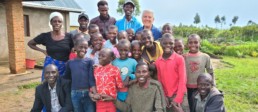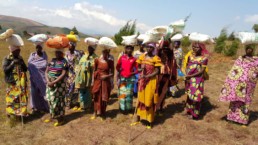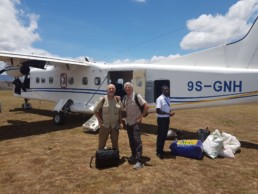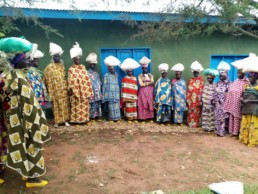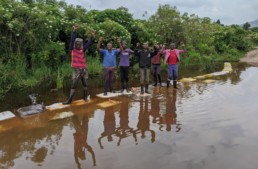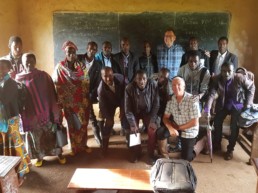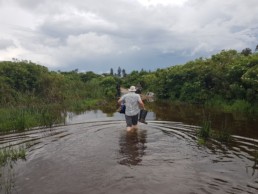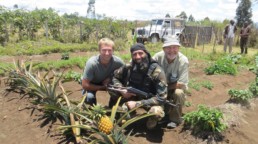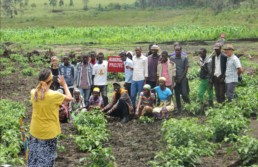We're Back in Minembwe! Well… Some of Us
Lisa and I finally arrived in Minembwe on January 21. We had to leave Miles, Emilee and the four girls behind in Bujumbura as all of us got the flu (not COVID), but Emilee and Ruth didn’t recover in time to travel/fly on our appointed date. The good news is that all the Ostranders are now healthy.
Fortunately, right now there is a time of relative peace here in Minembwe. The good guys, the local militia, that was formed to battle the bad guys, the Mai Mai (rebels), have done an amazing job at pushing back the rebels. Another huge benefit to this is that a good number of DRC government soldiers, who were fighting alongside of the Mai Mai, have been captured, wounded, and killed, which has discouraged the soldiers from continuing to fight alongside of the Mai Mai. That said, we can hear RPG’s (Rocket Propelled Grenades) being fired waaaaay off in the distance. Right now there is a MUCH lower presence of the DRC soldiers in our area of Minembwe, which means almost no incidents of harassment of the locals by the soldiers; before the soldiers were stealing from the locals, as well as beating them, and even killing them. When I was here back in February of 2020, it was the most uncomfortable thing about living here.
Lisa and I are assessing the physical situational needs here in our area. Our top two priorities at this time are to continue to get more food, seedlings, and seeds to the refugees, and to address the overcrowded housing situation for the orphans.
Somehow!
Michael
Finally Some News... and the COVID Funhouse
Apologies for the gap in communication from us. We had been hoping to send an update for a long time, however our travel plans have continually been interrupted by border closures, limited flight availability, local fighting in Minembwe, the threat of a coup and political crisis in the DRC, and finally a last-minute change in our landing destination when neighboring Burundi finally reopened its airport.
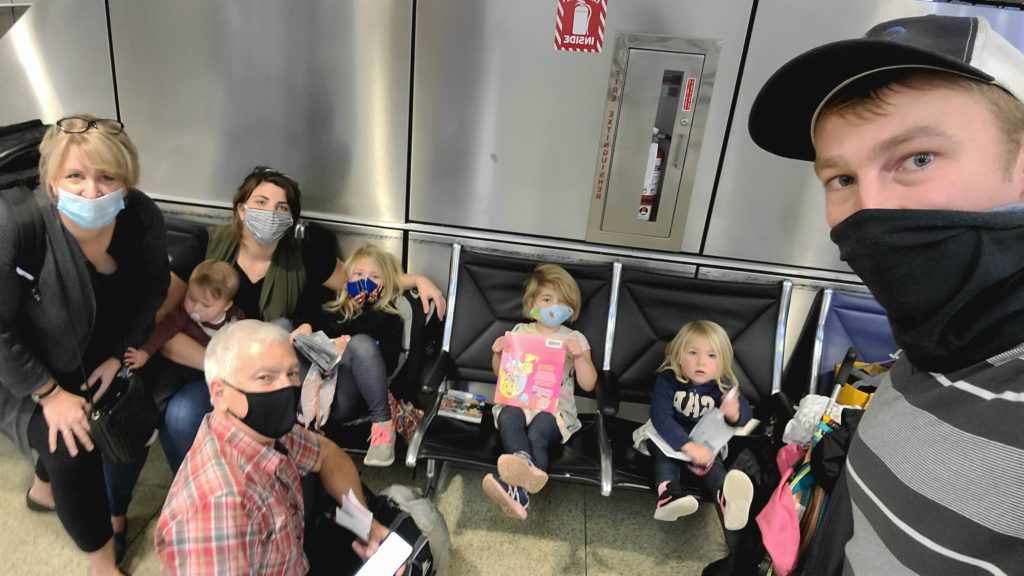
In Seattle, ready to begin our 33 hour journey, glad to not have to touch the 18 checked bags (above) for awhile.
We landed in Bujumbura, Burundi on December 5. We chose to land in Bujumbura rather than in the DRC as the DRC is a little sketchy these days due to a serious government power struggle, which led to the president dissolving the parliament, which led to demonstrations and clashes.
While we are in Bujumbura, Miles and I hope to train with a well drilling ministry located here to learn more about the process and equipment needed for drilling wells in the Minembwe region in the DRC. Once we observe which direction the political situation in the DRC will blow, then we will be making our way across the border and back up the mountain to Minembwe.
If you are interested in reading the more detailed story of our experience with the new process and requirements of a COVID-related entry into Burundi, and our then required quarantine in Bujumbura, continue reading below.
Somehow…
Michael
*****
After 33 hours of flights and layovers, the eight of us stepped off the plane in Bujumbura and into a long line to begin the newest arrival process due to COVID-19 restrictions. After standing in line for a short while in the hot sun and humidity, a policeman wanted to advance just Emilee and the girls to the front of the line to get processed, but Emilee needed our help with the four little girls, so we all stayed in place. Shortly after that, some kind Burundians ahead of us welcomed us to advance far enough to at least get the girls out of the sun. After being in line for a long time, a very nice man ahead of us pleaded with the officials for us to be advanced because of the girls. The officials refused, so this man welcomed us to stand in front of him and another man; now we were only a few people from the front of the line.
We had been told and also had read that officially the girls were young enough to NOT require the COVID test on arrival ($100 each), so when we got to the first window to pay for tests, we only paid for the four of us adults. Once we had done this, we moved to the next window to process paperwork. As we were in that line, some other parents (both Africans and foreigners) who had moved through the process earlier than us came back as they were told by the border control that their children needed the test and they had to pay. We joined them in trying to argue our case, but this was getting us nowhere, so we paid for the girls to be tested. The law isn’t really “the law” here… everyone with a little power and leverage makes up their own rules, especially if money is to be made.
After finishing at the next window, we stopped to get all of the paperwork checked before they sent us to the border control window to process our passports. After they finished with my and Lisa’s passports, Lisa noticed that the date stamp was for the previous day. It was now past 4pm, so just imagine how many people before us had the wrong date stamped in their passport. It took some convincing, but the man finally changed the date on the stamp and re-stamped our passports. Our next step was to gather our 18 pieces of checked luggage and relocate to the COVID testing area just outside of the airport.
We now sat inside of a big wedding tent in plastic chairs. This was now the “line” and every time someone progressed, everyone then got up and moved up a chair. Prior to this point we had been admonished each time any of our family members got within six feet of one another, but everyone was sitting inches away from one another and then sitting in one another’s chair. But… masks were being worn! While in the “chair line” we had to show proof that we paid for our COVID test and that we had booked a hotel for our required 3+ days of quarantine, and then we received our vials and swabs. The next step in the COVID Fun House was going to another tent to get our COVID tests done, which this time around was getting our throats swabbed. Kids and adults alike gagged, but it sure beats getting your brain swabbed via a stick up your nose like they had done to us in the US.
After that, we loaded onto a bus that took us and others to our hotels to be quarantined; our 18 bags and gazillion carry-ons had to be loaded into the bus with us as the luggage area under the bus was unavailable for some reason. Before we had arrived, we had chosen a hotel that was up on a hill so we’d get a breeze, and another bonus was that it wasn’t as expensive as some of the others that were in the center of town or near the lake. We chose the breeze option because it didn’t matter which hotel you stayed at as you can’t leave your rooms anyway.
We heard so many different stories about how long we’d have to quarantine, but we knew we would get retested if anyone on our last flight (Ethiopia to Burundi) had tested positive at the airport. Well, eight people had tested positive, so three days after arriving in Bujumbura, and still under quarantine, everyone from our flight was transported to a hotel in the center of town to get retested, then back to our respective hotels. We all stood just outside in the hotel’s outdoor entrance area or in the landscaped front garden; the girls were happy to finally be outside and they ran around on the grass playing various games.
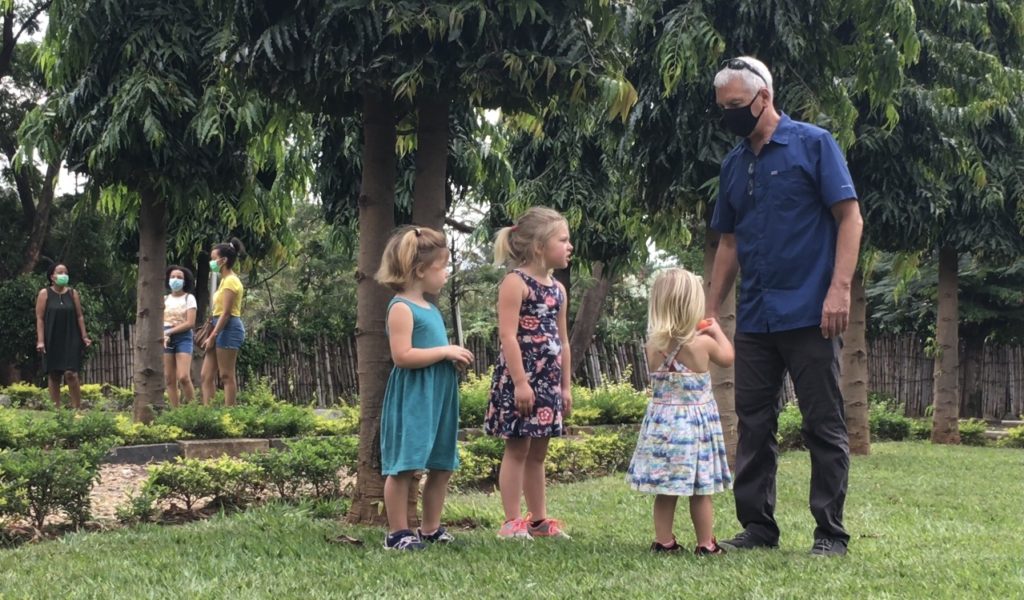
Grandpa laying down the ground rules for Red Rover.
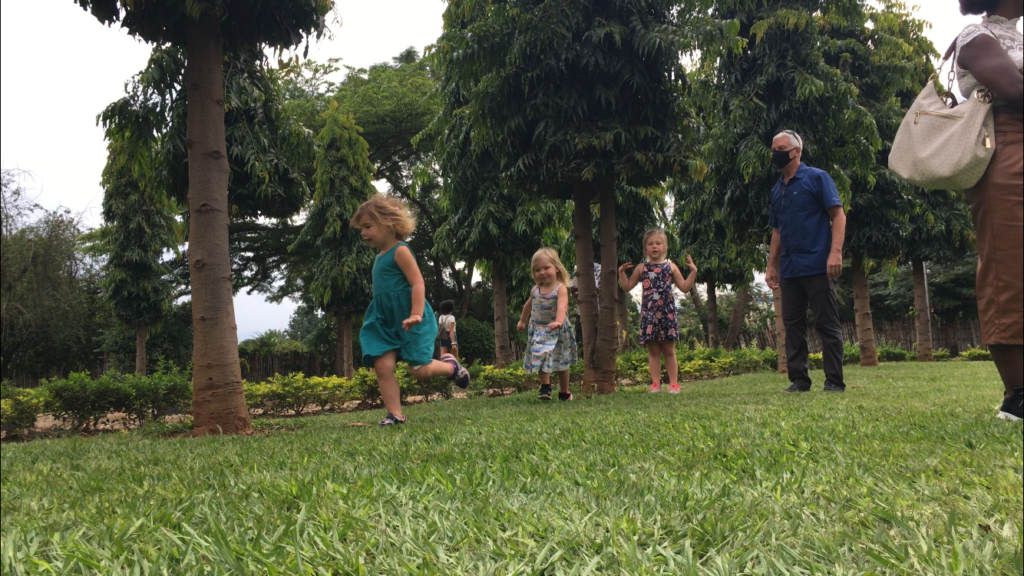
Let the games begin!
Today, two days later, we received word that we all tested negative, so we were able to move, not a small feat, to the budget hotel we always stay at when we’re in Bujumbura. Now it’s time to get to work!
Once again… somehow!
Michael
Stranded... But Still Moving Forward
The Moores and the Ostranders are currently still stranded in the United States. Ruth Ostrander, our newest family member born on March 30, is still awaiting her passport. Needless to say, no one in the US State Department seems to be too interested in their citizens traveling abroad. How long will it take to get a passport for Ruth? Uh… good, but unanswerable question. Once Ruth receives her passport, then we have to apply for her DR Congo visa; then, once we get her DRC visa, we will be able to set our dates to return to the DRC. Good news is that the DRC borders and airports are beginning to reopen in August.
One bittersweet silver lining of missing our June 24 departure date was that I was still in the States when my mother’s health took a sudden turn when it was discovered that her body was ravaged with cancer. Rather than being kept away from my mom due to COVID restrictions, a series of strange but fortunate circumstances arose that made it possible for my sister and I to be together at my mom’s side in her own home the final week of her life up to the moment she passed away on July 17. We all miss “Nanu” greatly, but we are happy that her final weeks and days were peaceful and without struggle.
Right Now In Minembwe
Regarding the ministry work in Minembwe we have been able to keep the most critical refugee food and garden projects continuing. We are extremely blessed to have trusted local co-workers who are committed to the community. As for the funding, when you read “we bought” in the below captions, “we” means many of YOU!
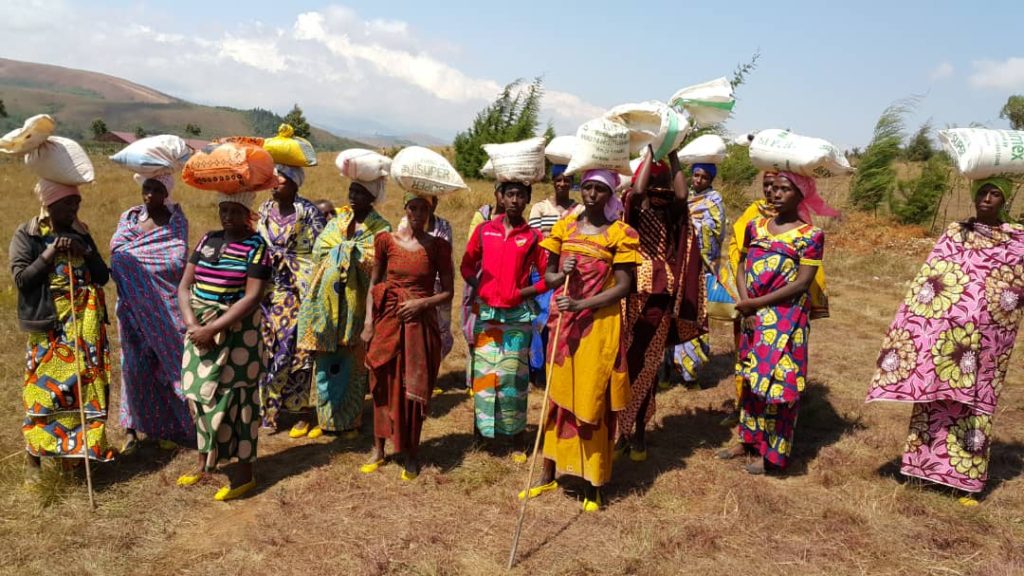
In May, June, and July, we bought 62,700 lbs. of cassava flour that was distributed to feed 22,800 people—enough to feed families for a few weeks after each distribution.
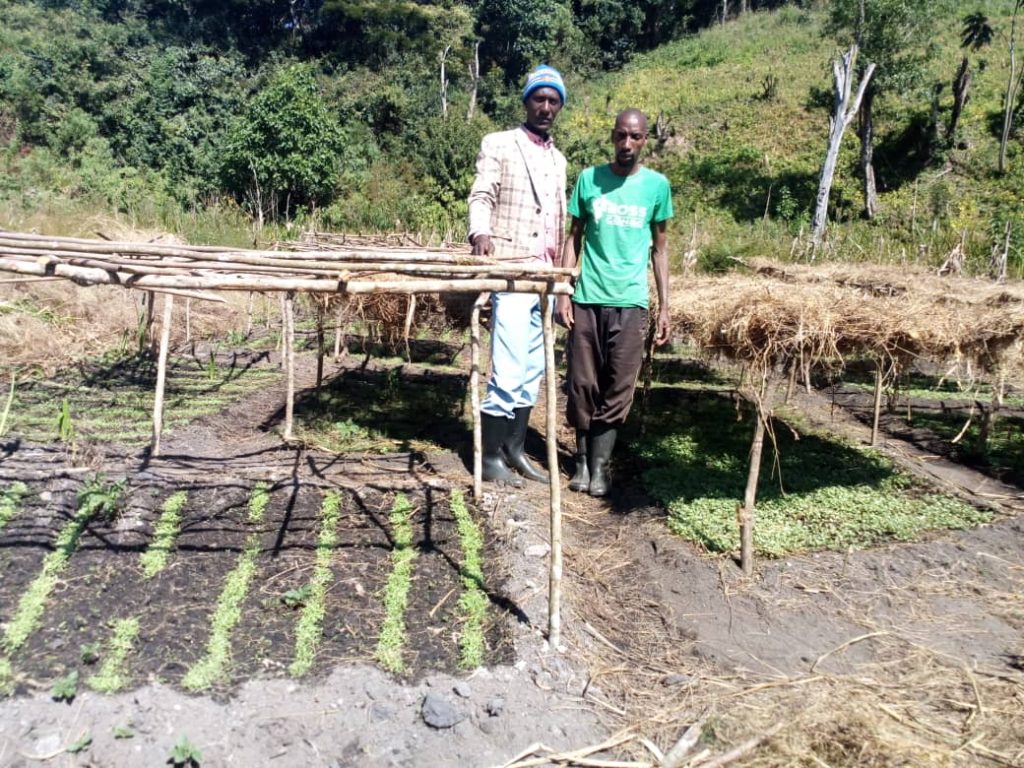
One of our many nursery locations that has been supplying the refugees with vegetable starts for their gardens.
We also bought enough Irish potato starts that, once harvested, will feed 960 people for three months and enough sweet potato starts that, once harvested, will feed 720 people for three months.
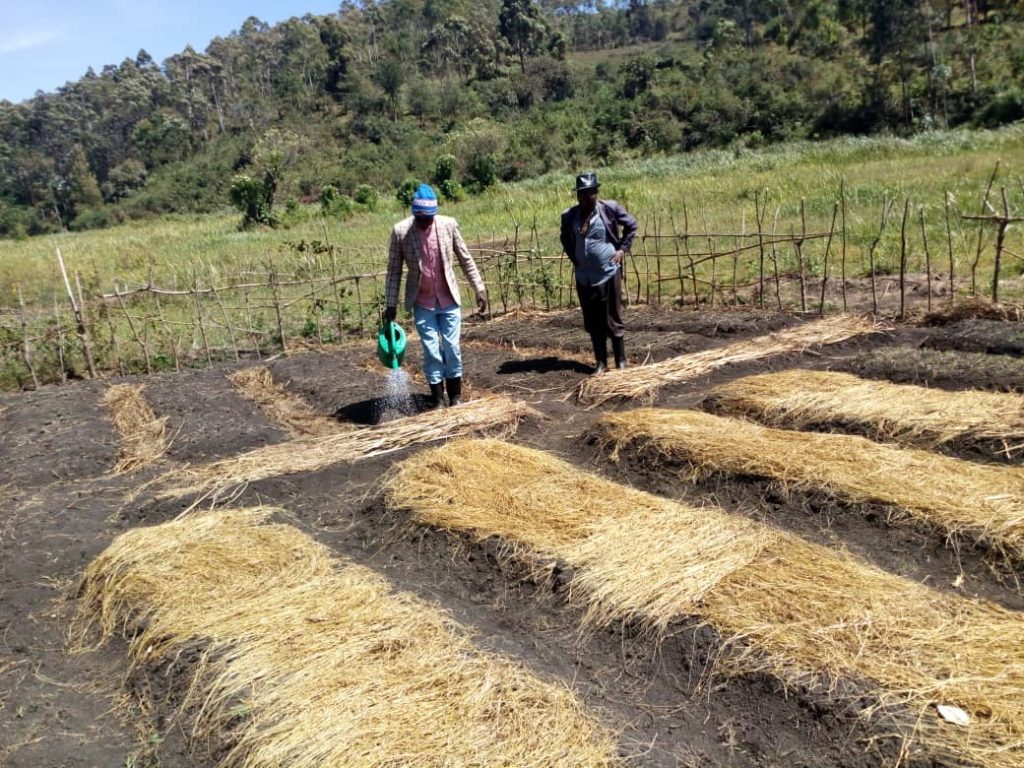
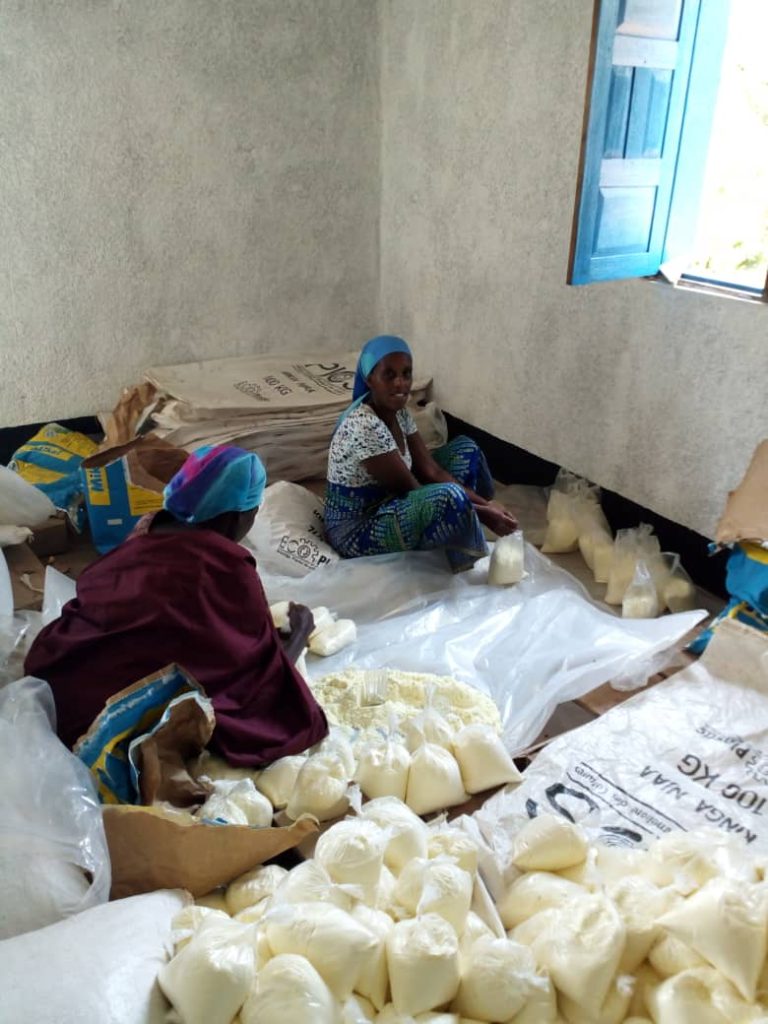
2,900 lbs. of powdered milk were purchased and distributed to nourish 2,000 children five years old and under.
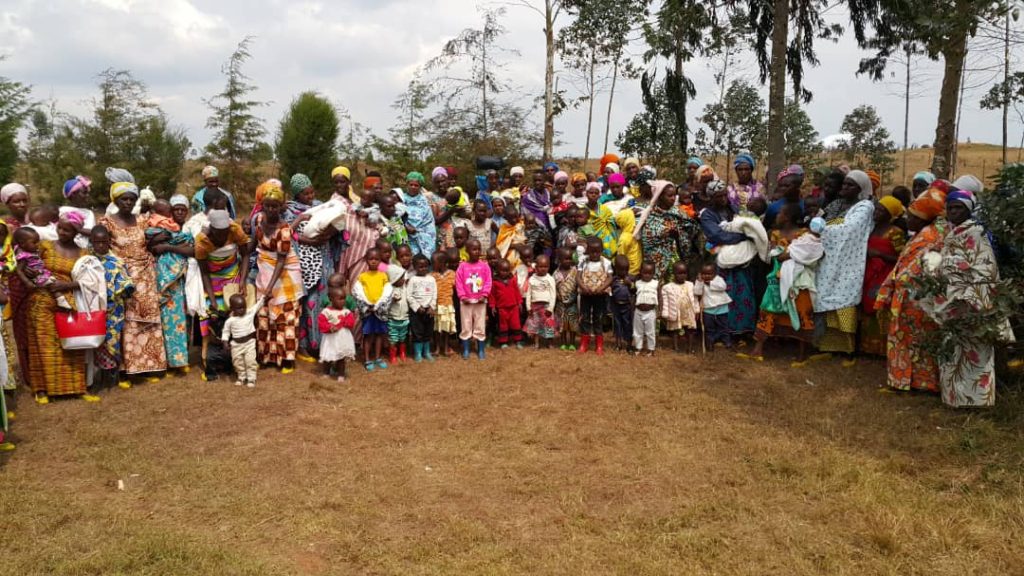
Many have asked about the COVID-19 situation in the DRC. The last time we looked, there were 9,605 confirmed cases and 238 deaths, most of them being in the capital city of Kinshasa and several other large cities. In Minembwe, we are told there have been no cases, but there also are no means of testing for COVID-19 in Minembwe.
And as far as the fighting… sadly, it’s still on-going.
Somehow!
Michael
Minembwe "Airport"
***To clarify, at the time that we published this story we were not in Minembwe.***
Due to the irregularity of available flights via the UN helicopter to and from Minembwe, we’ve had to make use of the Minembwe “Airport,” which for the moment is visited somewhat regularly by airplanes. To control the airport would be a jewel in the crown of a rebel group, but fortunately, to date this has not become a reality.
To book a seat on a plane, you call a local man who comes to your house and collects money, and writes your name on the passenger manifest, aka a notebook. On the “scheduled” day of our flight, we walk 1,800 ft. to the airport, then check in (our names crossed off in the notebook)…

…get our bags weighed, and then if you are thirsty…

…you might head on over to the concession stand to get something to drink.

Then you wait, maybe minutes, maybe hours, or maybe you walk home, unpack enough for the night, repack in the morning, and try again the next day(s).
So, while waiting, you pose for photos…


…or look for interesting designs on the ladies’ kikwembe fabric such as spark plugs…
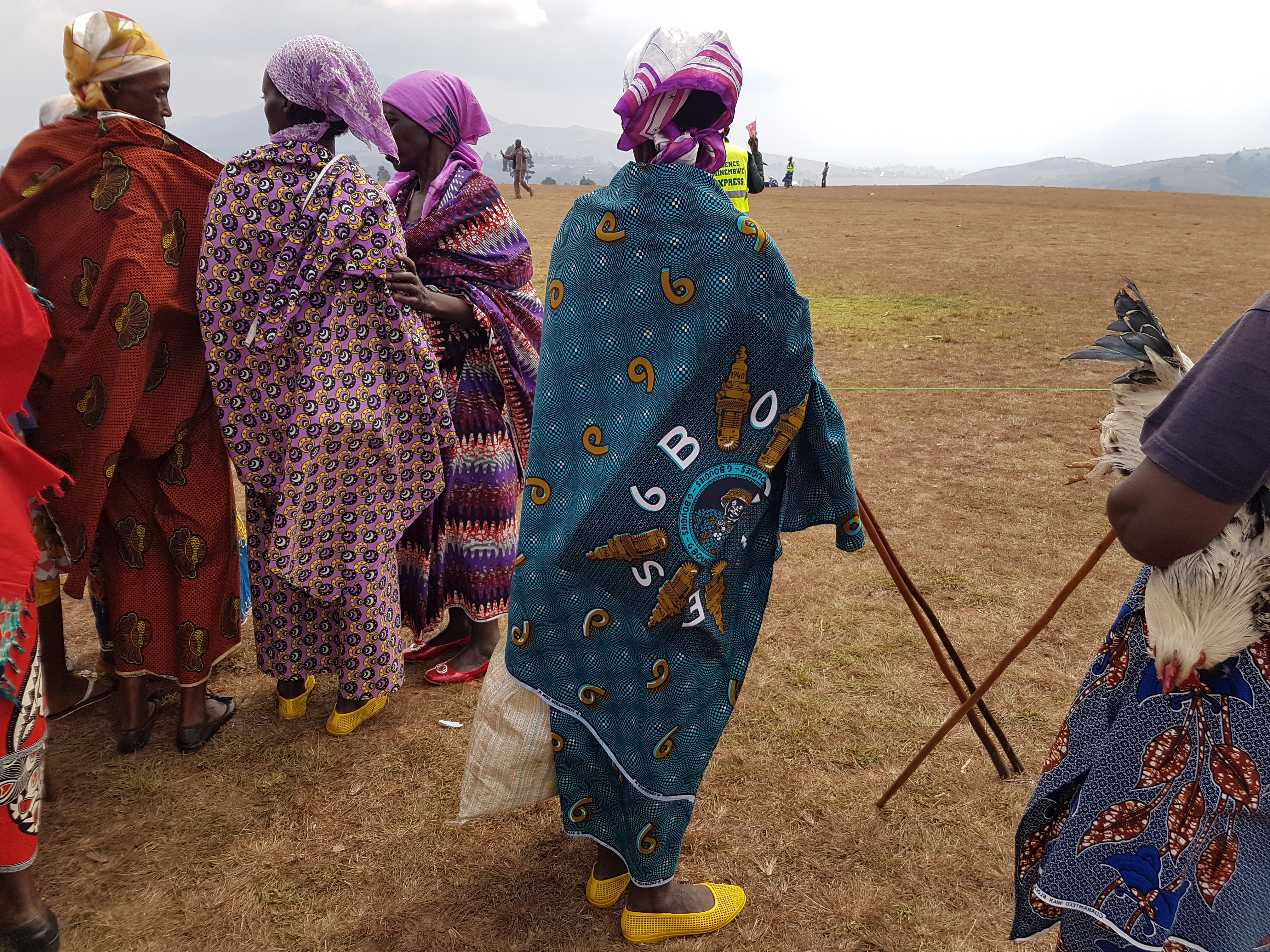
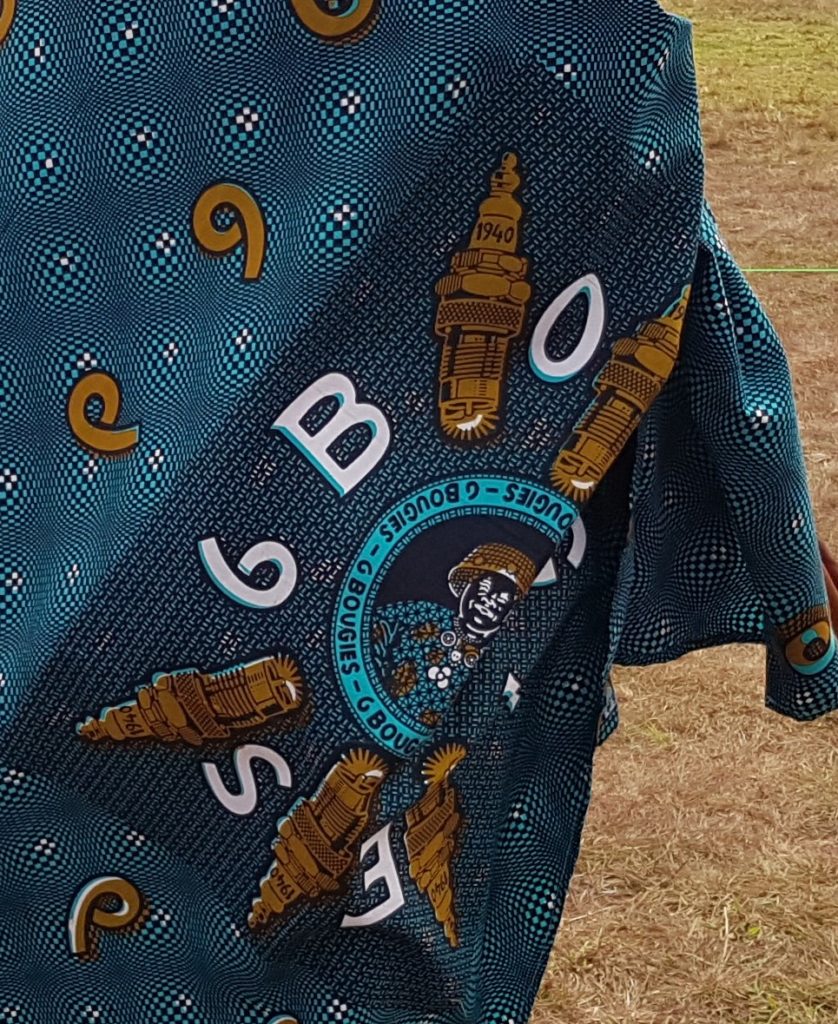

…or wonder how close to your bag the live chicken is going to be stored on the plane because your bag’s zipper doesn’t quite seal your bag.

But the airport is at the crossroads, so you may have “guests” accompany you to the “waiting area” such as Joyeuse, the eldest of the “kids” at the orphanage (and now in her second year at the university!!!)…

…or maybe your neighbor and good friend, Pastor Magaju, might be passing through…


We’ve been blessed to get to know and to become good friends with Captain Ted, owner of Busy Bee Airlines.
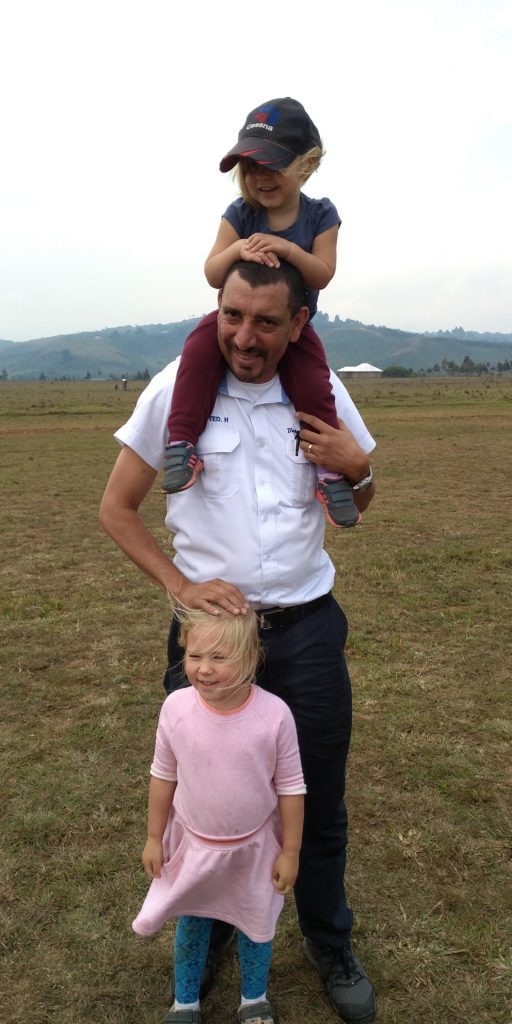
Captain/Uncle Ted is a great “family man” and he extends his love of family to ours as well.
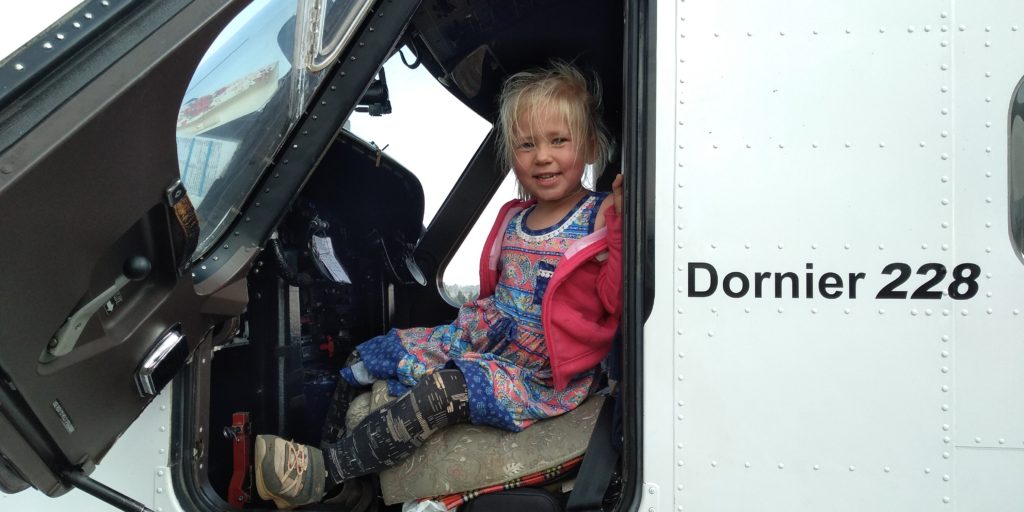
It’s not too difficult to imagine this scene becoming a reality one day in the distant future.
The last time Lisa and I flew together out of Minembwe, we had to show everyone on the flight how to buckle a seat belt as it appeared to be the first flight for everyone on board. Once the plane landed at our destination, Lisa and I were ready to exit the plane, but no one was moving out of their seats to disembark. We then noticed that everyone was still buckled in, so we repeated the seat belt instructions in reverse, and everyone was happy.
Somehow…
Michael
The Big Mess in Minembwe
First, some good news. Our arrival in the States was due to the pending birth of yet another Ostrander baby, a phenomenon that happens nearly every spring. So… allow me the pleasure of introducing you to Ruth Kristiina Ostrander. Ruth, born on March 30, was immediately adored by her sisters Bella, Sophia, and Aimee.
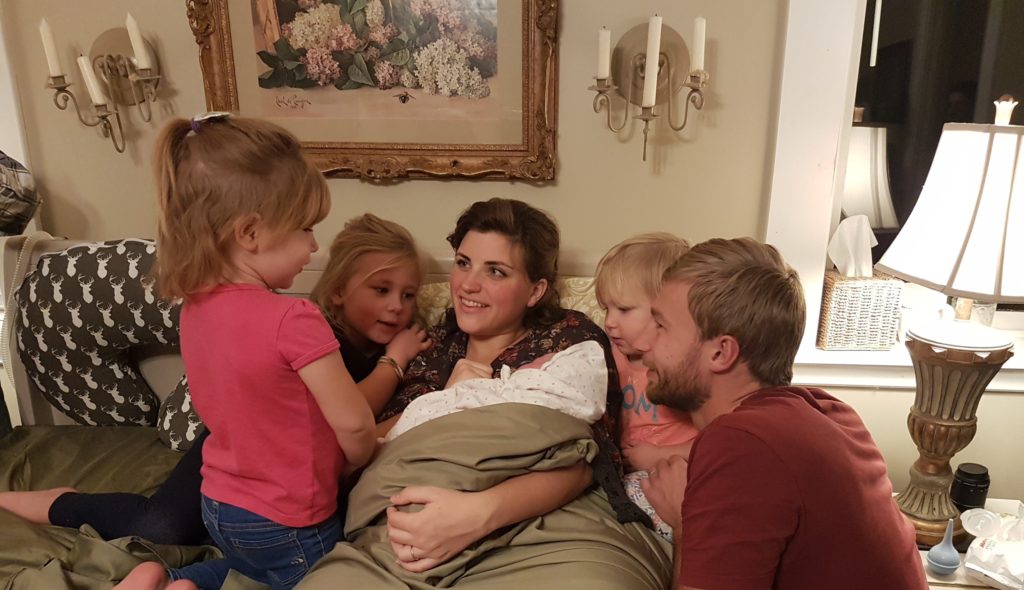
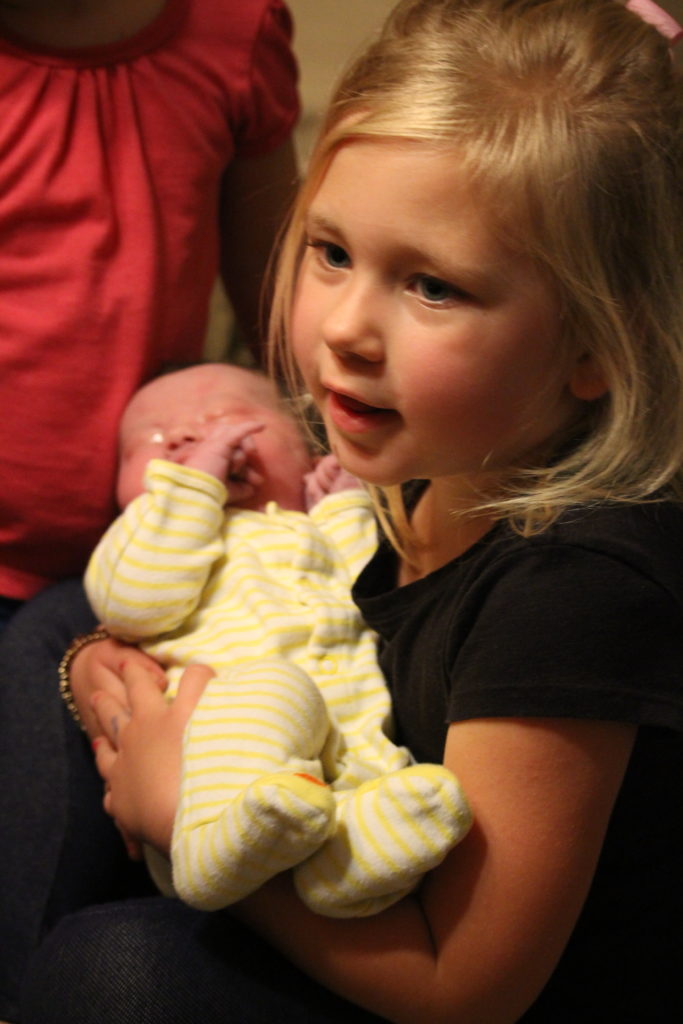
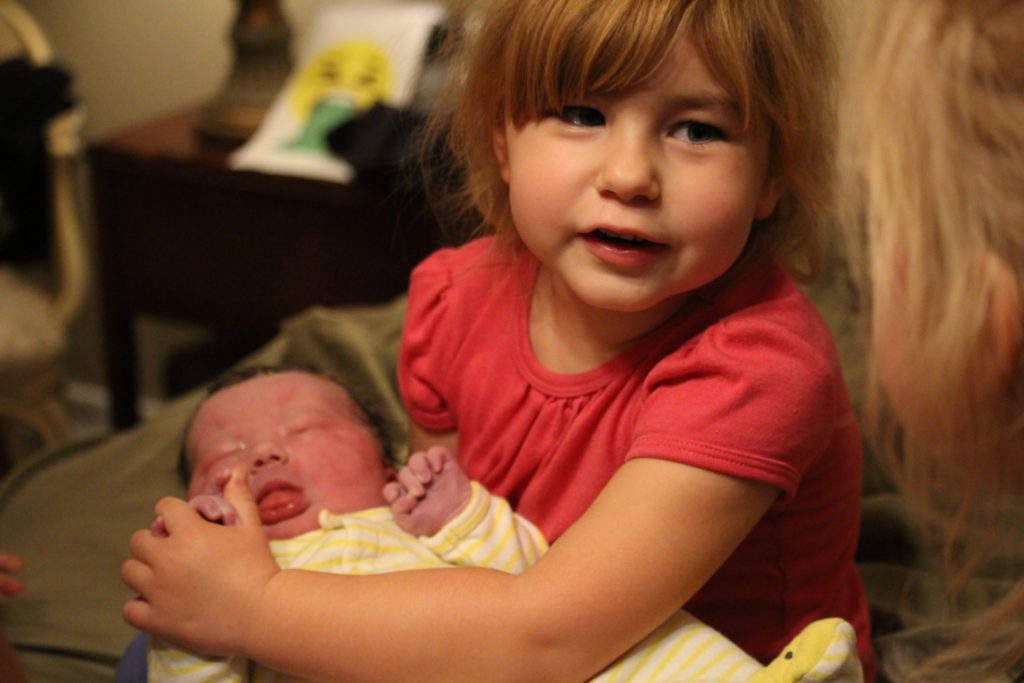
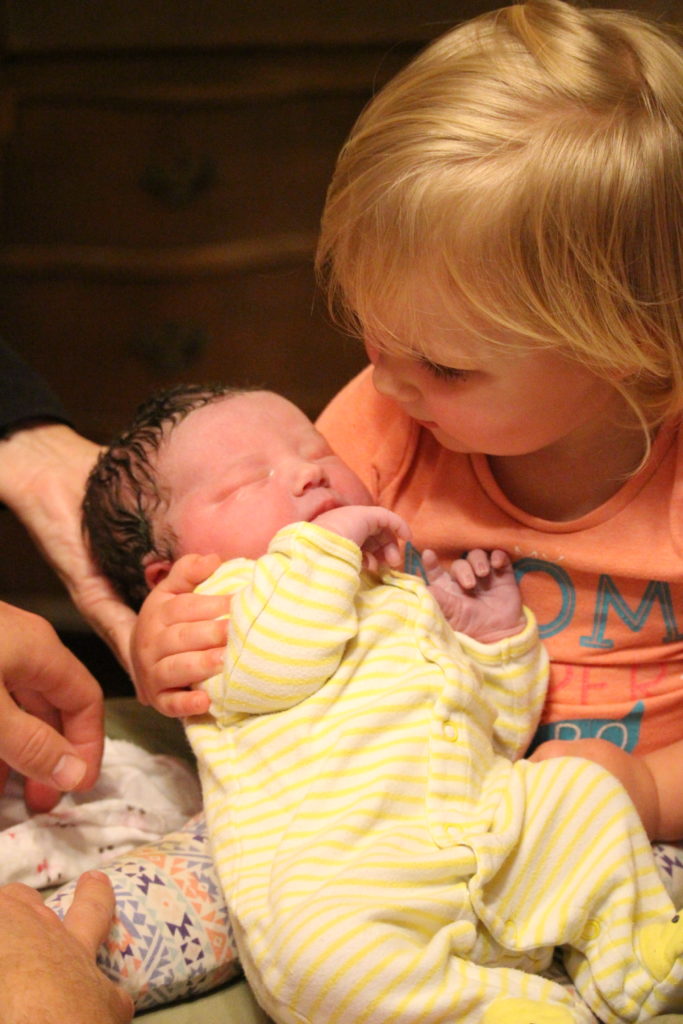
Unless things change due to the COVID-19 issue, Ruth, along with the rest of us, will be flying back to the Democratic Republic of Congo on June 24.
Hopefully we’ll get to introduce Ruth to the people of Minembwe on June 27, but life in Minembwe is quite desperate at the moment. Just before I (Michael) left Minembwe to come to the States to attend Ruth’s birth, some days were filled with the sounds of conflict/war (mortar shelling and gunfire) and some days we heard nothing but the moos of the cows that had yet to be stolen or killed. The loss of life amongst the locals weighs heavily upon everyone as their family and friends are either being killed in the outlying villages, or as they herd their cows, or as they fight off the Mai Mai rebels.
Lack of food has become a crisis unto itself due to the conflict as our area of Minembwe has been overflowing for months with a huge number of refugees from the outlying areas. Fields planted by those who had to flee were not harvested, though some people tried to sneak back home to harvest and this resulted in a few kidnappings or deaths. Many of the refugees who fled to our area months ago didn’t plant during the recent planting season, thinking that they’d be returning home soon to plant, further impacting the serious lack of food at the moment—starvation is a reality for the community.
For months now, as the funds have come in, we’ve been working alongside of the university staff to purchase food in bulk to then distribute to those in need. When we got down to the last of our beans a couple weeks ago, we had to make the hard choice to have the remaining beans planted rather than consumed.
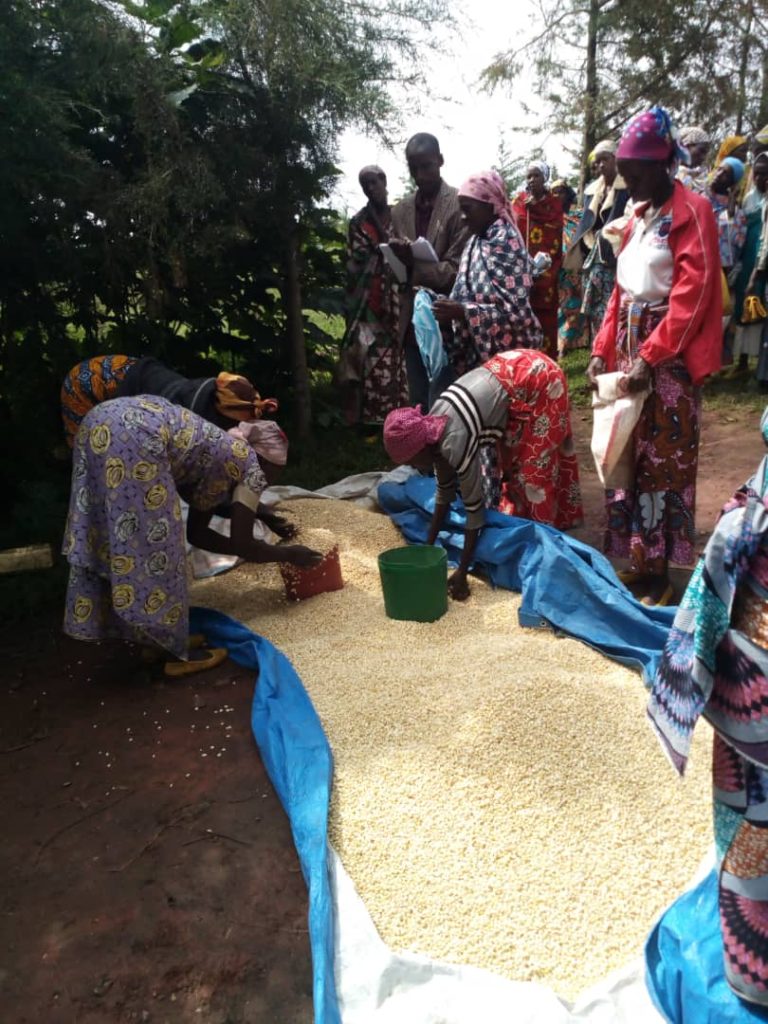
Distributing corn.
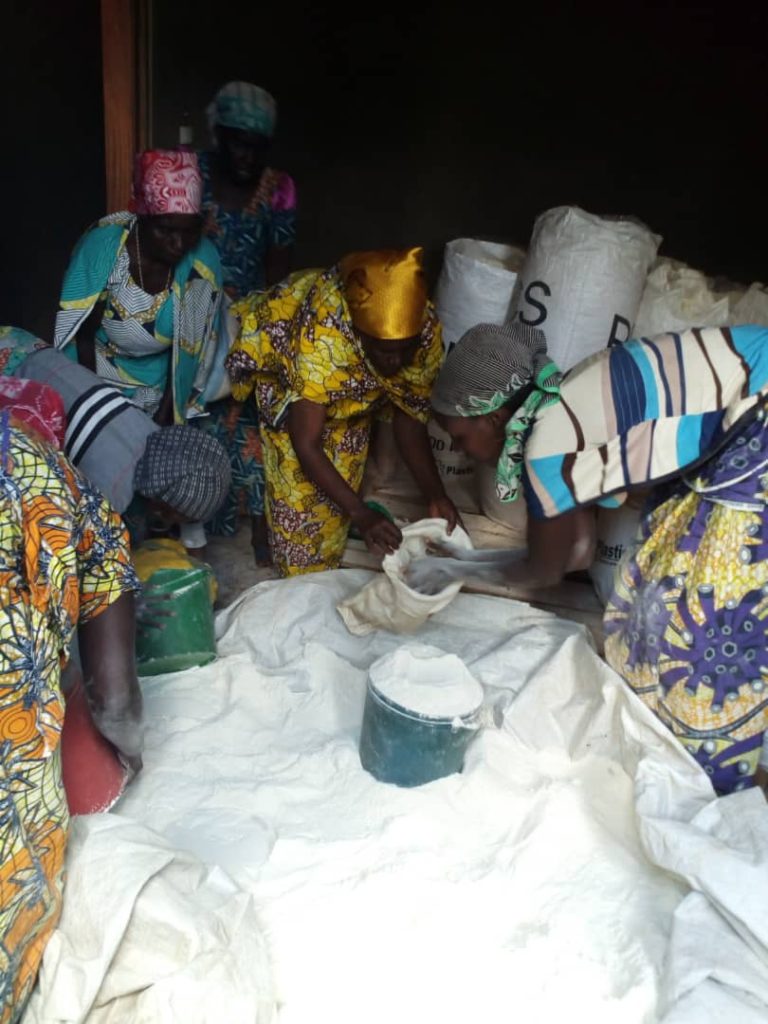
Distributing cassava flour.
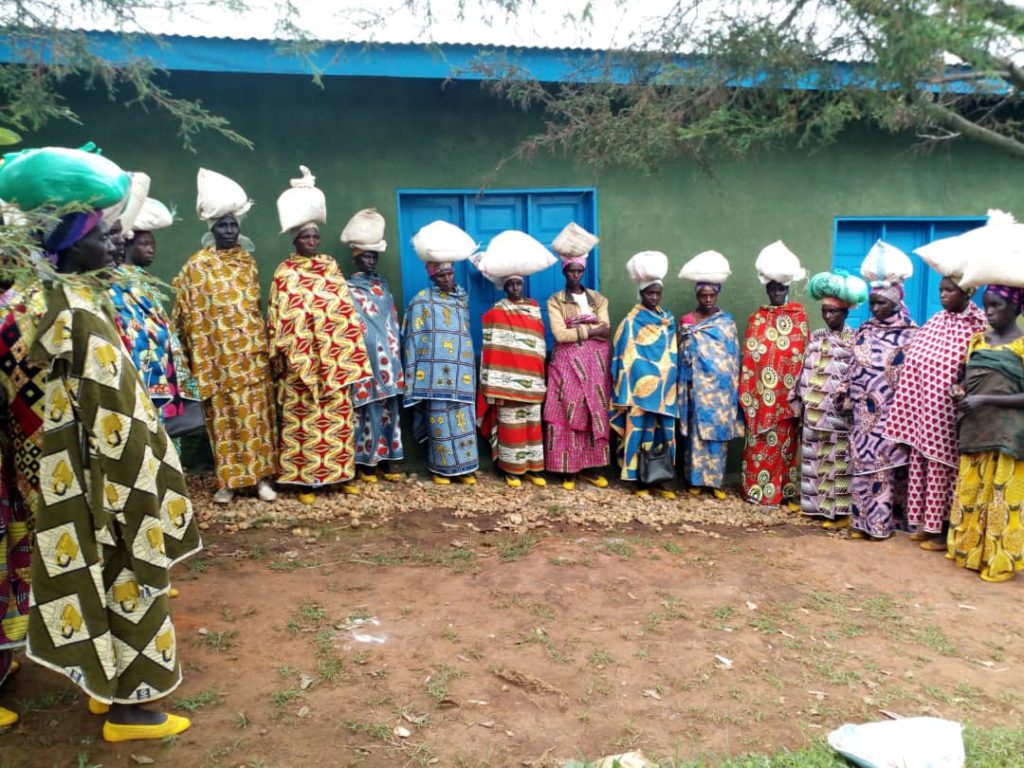
Ready to take the flour back to their families.
Most people are now surviving on cassava flour cooked into a porridge or into ugali (a “bread”) and eaten with whatever vegetables are still left in their gardens. We were trying to arrange for two plane loads of beans to be flown in from a city below the mountain, but the prices of beans and other food supplies have skyrocketed due to the COVID-19 prevention causing border closures.
It is now potato planting season in Minembwe, so we are currently trying to raise funds to purchase sweet potato starts to get them into at least a hundred local gardens so that in a few months there will be a more nutritious food source available. Please let us know if you would be able to help us with this vital need. We also have an ongoing program for the planting of nurseries of various vegetables; these “starts” are then distributed to the refugees to plant in their own temporary gardens.
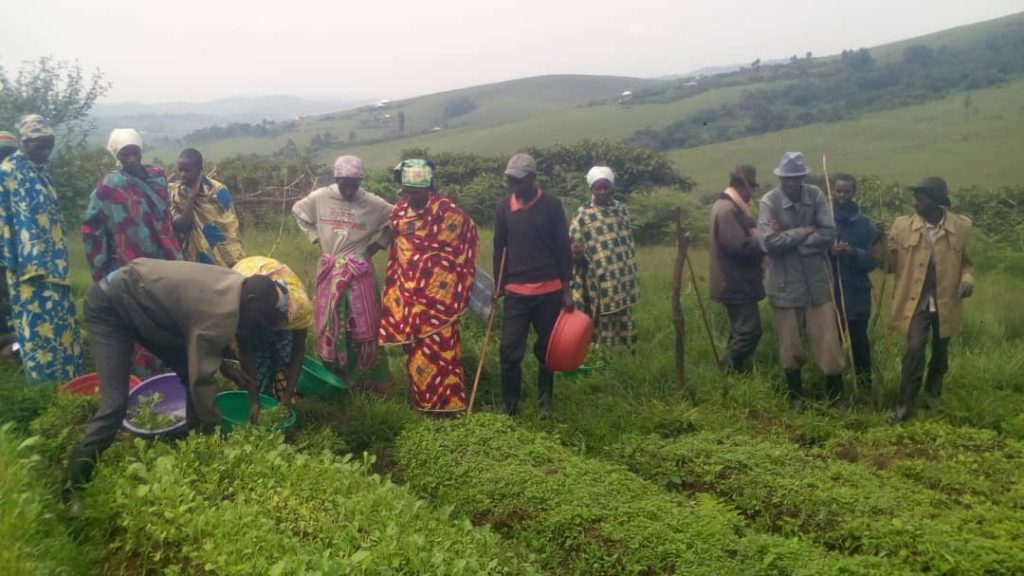
Pulling the vegetable starts out of the nursery and distributing them to the refugees.
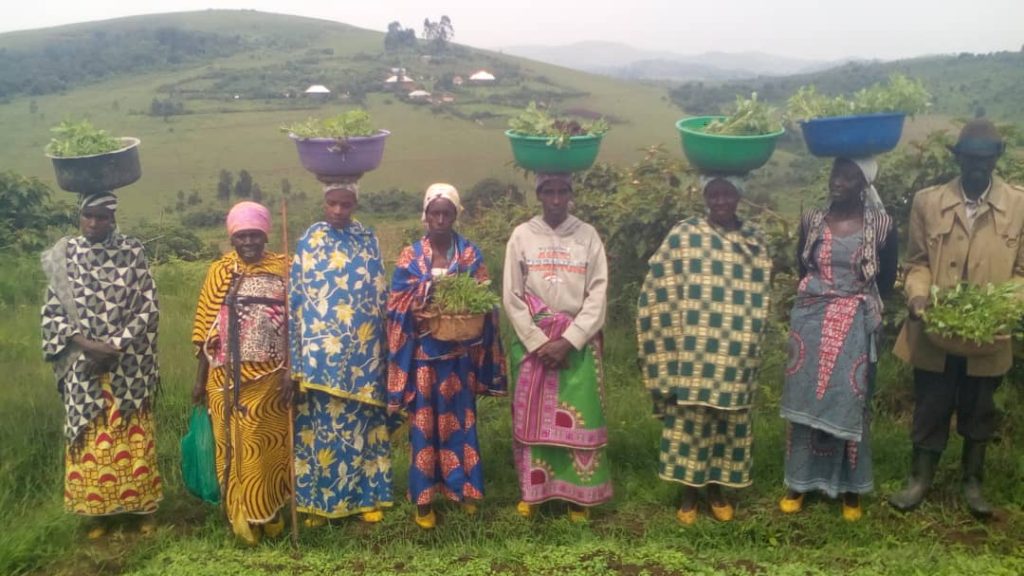
These refugees will now take these starts back to a garden that's been provided to them to plant these starts.
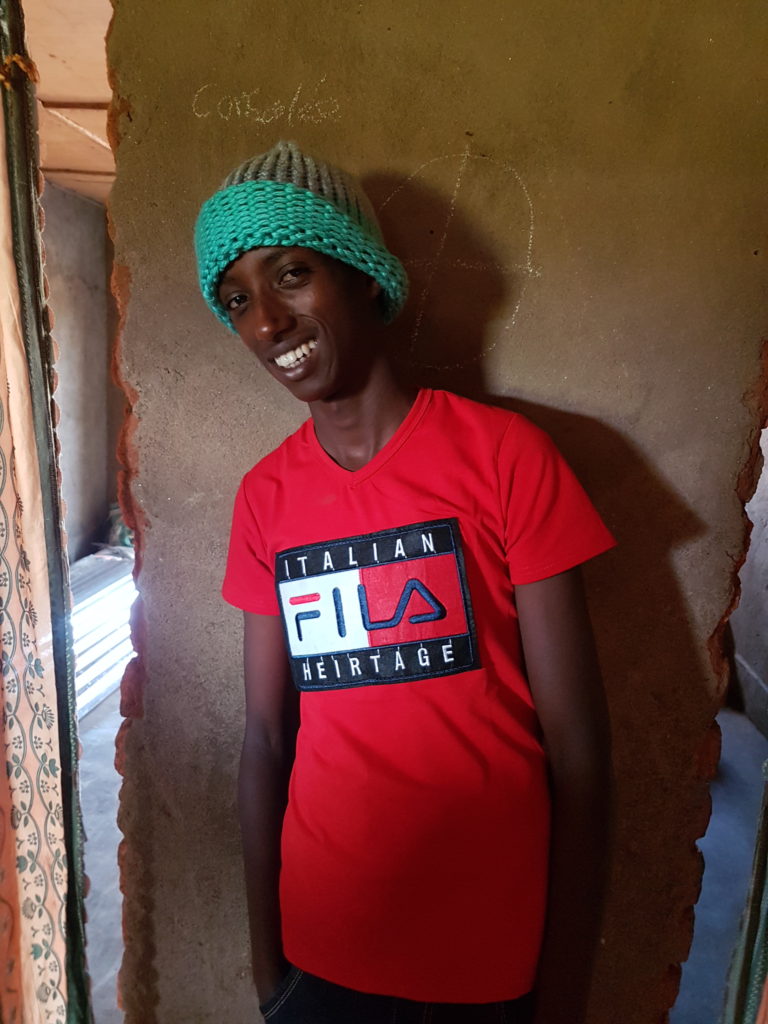
Another point of prayer is for Prince (above), one of the orphan children who we mentioned in a recent blog as needing to get medical help for an unknown critical condition.
With an accompanying adult, Prince sought medical treatment in hospitals in Eastern DRC, Burundi, and Rwanda before we had to send him on to Nairobi, Kenya. The doctors in Nairobi were able to administer the proper tests and have determine that Prince has Duodenitis, which is a severe inflammation of the duodenum (the first part of the small intestine just below the stomach). Prince is now halfway through his initial three weeks of treatment and so far has only experienced a slight reduction of pain; additional treatment will follow. During this treatment, all the borders between Kenya, Rwanda, and the DRC were closed and the hospitals shifted to only providing essential medical care. Please pray that Prince will be allowed to complete all of his needed treatment, and that he and his escort will then be able to cross the borders to return home when all treatment is finished.
Somehow…
Michael
Bridge Over the River “Why?”
There’s an area of a “road” here in Minembwe that typically floods during the rainy season. Like everyone else, we circumvented the flooded area by walking around it through peoples’ fields right next to the road. But, as the flooding of the road got worse, more and more people decided to take the path through the fields, which eventually lead to large-scale crop damage. We were made aware of the damage as one of these fields belonged to a woman, Momma Chance, who works with us, so Miles decided to look into the situation. Since a permanent solution was impossible to construct due to the current flooding, Miles temporary solution was to use two rows of sandbags sandwiching a row of rocks.

Miles initially made an effort to get the community involved in the project, but we often heard the excuse “why?”
“Why should I do this if you are not going to pay me?”
“Why should I volunteer if others won’t?”
“Why spend the effort when we can simply wade through the water?”
If you’re a man, wading through the water means stopping to pull off your boots and socks, then rolling up your pants. Women have it “easier” as they mostly wear plastic shoes, so they simply lift their skirts up to their upper thighs and walk on through, although the shorter women have to hike up their skirts to their waist, which exposes way more of Africa than I wish to see. One might think I’d get used to this with how many times a week I walk past naked women bathing at the spring along our path to nearly everywhere. I’m still not sure whether I’m culturally supposed to still verbally greet these women as I walk on by, or if there is a special greeting I haven’t learned yet of “Good day, my naked neighbor.”
Undaunted, Miles began the project with help from the boys at the orphanage, who saw this as a cool opportunity to be a part of building something unique.

The work ethic of these boys is amazing.

This work was repeated again and again.

Some of the volunteers were too young.

The guys… getting closer to completion
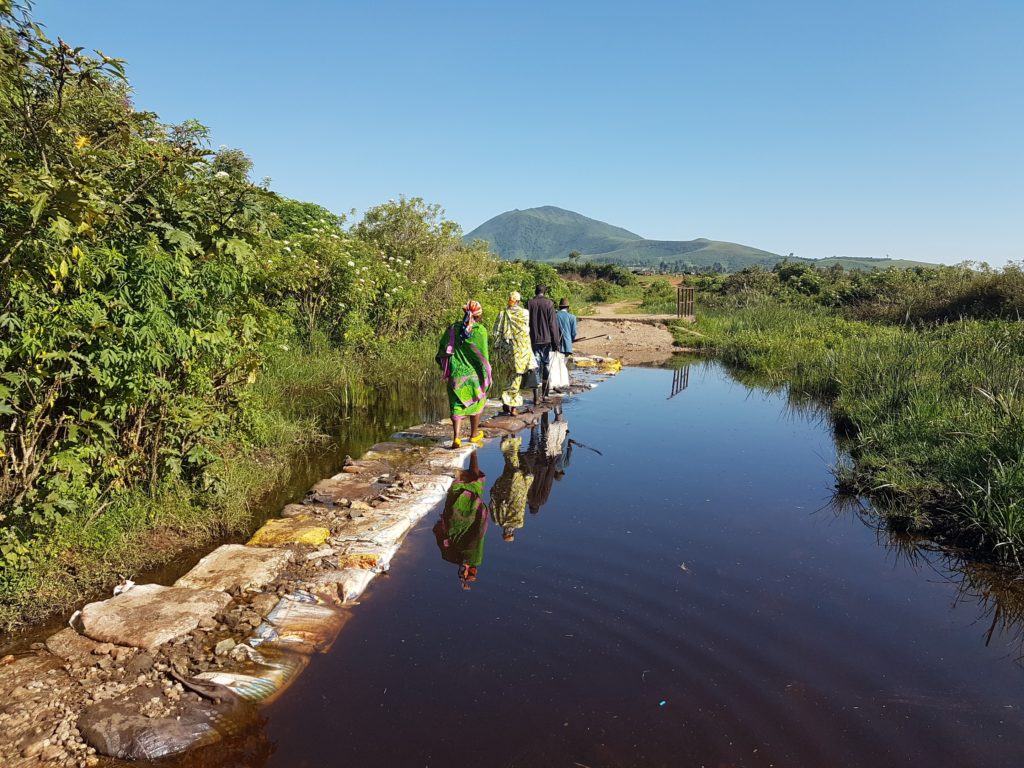
Project completed last week.
Somehow…
Michael
Cows and Goats and Mai Mai… Oh My!
The conflict/war here rages on, making it hard to really get into a “flow” so we’ve been doing our best to assess the situation and then accomplish what we can each day. One of the things that Brian and I have been able to accomplish has been to encourage and challenge the students of University Ebenezer University of Minembwe (UEMI). We began with a seminar that was open to all the UEMI students, focusing on their hopes and dreams for their future in Minembwe by teaching the basics of formulating a business plan.

The Business Plan seminar.

Class photo with the 80 or so students who showed up.
We followed this up with a three-hour class meeting for the students from the Community Development, Education Sciences, and Health Sciences faculties, focusing on how they can use their studies, and eventually their degrees to impact Minembwe and the world. Next week we’ll meet with the students of the Agriculture and Theology faculties.

With the Health Science students.

With the Education students, the future teachers of Minembwe.
In the midst of the ongoing conflict, one of our constant sources of joy is our relationship with the orphans. For a couple of years now, friends of ours from our hometown area in Washington State have knitted hats for the orphans.
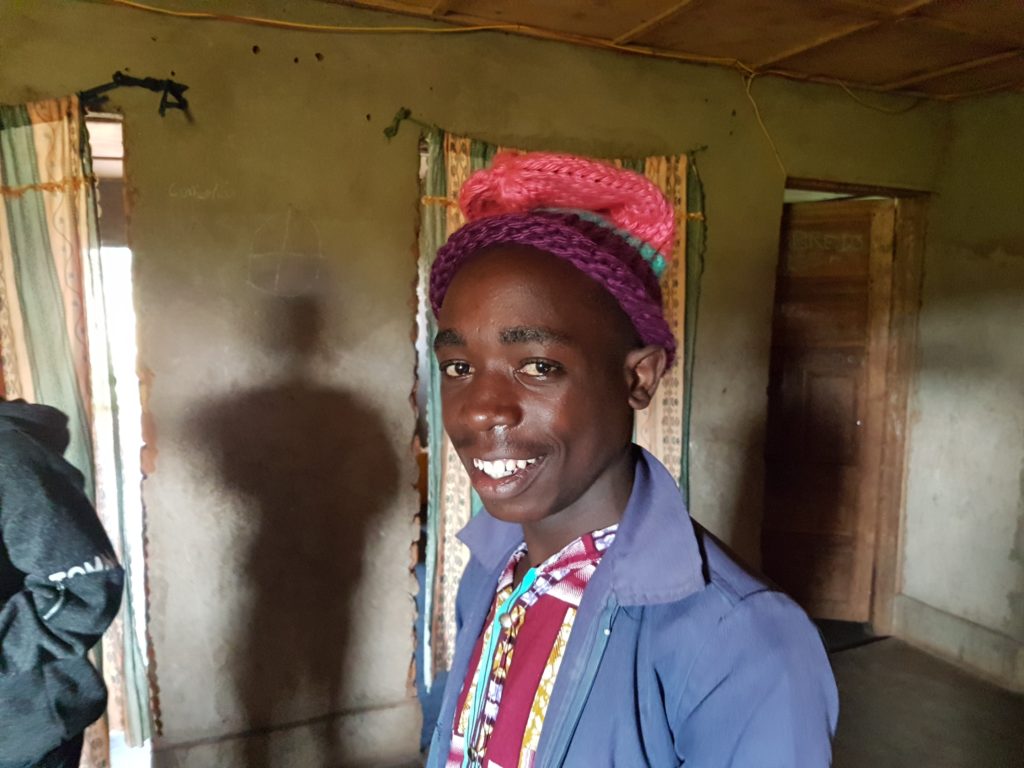
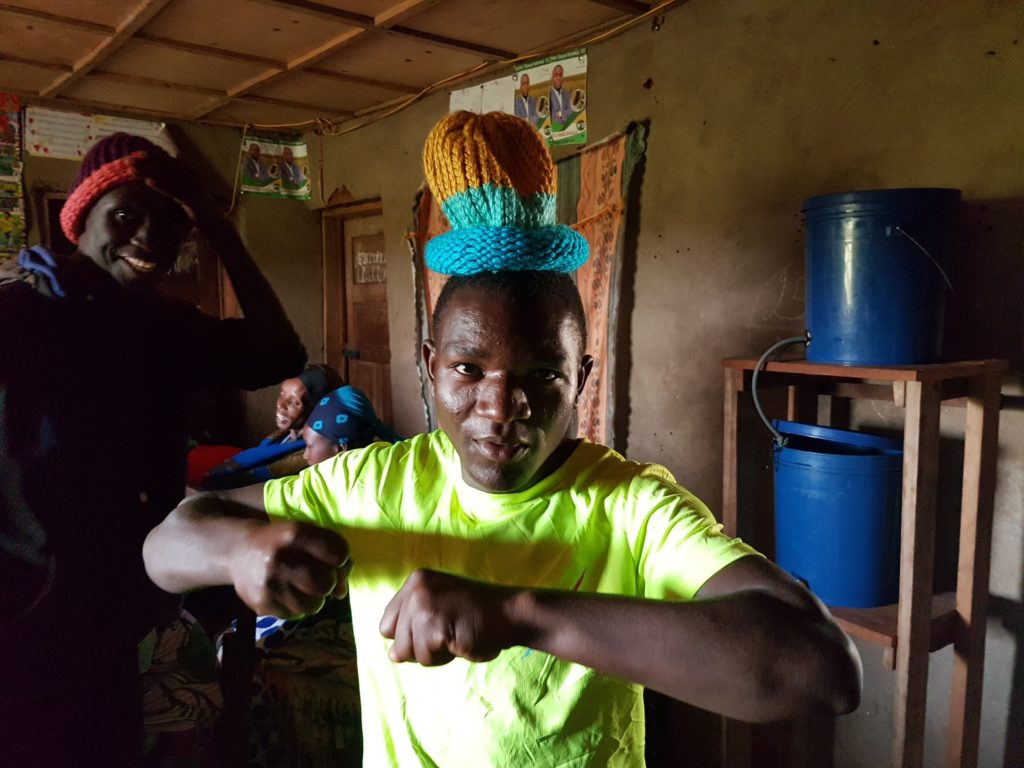
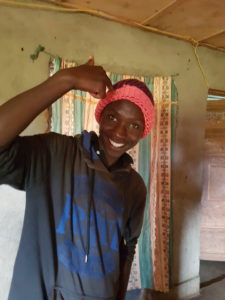
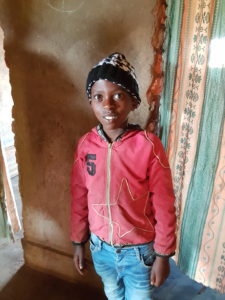

Please pray for Prince. This photo was taken on New Year’s Day, just after Prince and the director of the orphanage had returned to Minembwe after weeks of trying to get Prince’s mysterious six-month illness diagnosed (paralysis in arms and legs, horrible stomach pain, nausea, and pain in his back). The best any medical personnel there were able to do for him was get his strength back up with rest and nutrition. Prince was okay for a week, then he was back in our local hospital. Two weeks ago we finally got him on a plane to Bukavu, DRC, but nothing was revealed there, so he’s now in Kigali, Rwanda going through tests.
The plane that Prince flew out on was the first flight into Minembwe for Busy Bee Airline since the crash of one of the Busy Bee planes back in November that took the life of our friend Capt. Didier and 26 others that were on the plane and on the ground.

It was great to once again see our friend Captain Ted, who is also the owner of Busy Bee Airlines.
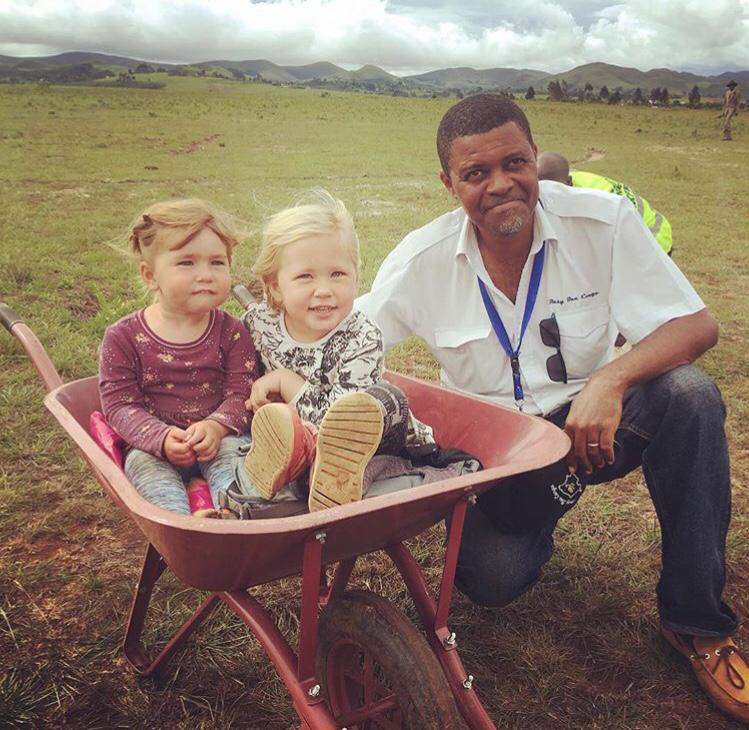
Bella and Sophia with Captain Didier in Minembwe last May.
Our daughter Demerey, a social worker by education and profession, has worked with a lot of people who have suffered from trauma. Due to the fact that I’ve been living in a war zone for the past eight months, Demerey has voiced her concern that myself and others need to be aware that going through a situation like this can result in us dealing with forms of Post Traumatic Stress Disorder (PTSD). We are trying to figure out ways to be proactive, if possible, by doing things to help work through the ongoing emotions and stress.
Here’s an example of how I’ve been dealing with the stress:
From the time we first arrived in Minembwe, we’ve had night guards whose sole duty used to be to protect our gardens from cows, goats, dogs, and chickens, but now naughty FARDC soldiers and Mai Mai have been added to the list. I recently reminded the night guards that if danger from the Mai Mai gets too close, that they need to pound loudly on my window as I nightly wear ear plugs to eliminate waking up to random gunfire.
Speaking of random gunfire, last week, at about 8 pm, Brian and I both heard a noise that sounded like automatic gunfire. We met each other in the hallway to discuss the noise and had a conversation something like this:
Brian: “Was that automatic gunfire?”
Me: “That’s too close for automatic gunfire; maybe it was the neighbor trying to start his corn grinding machine?”
Brian: “He’s trying to fix his corn grinder at eight o’clock at night?”
We stand and listen for more gunfire or corn grinding but it’s quiet.
Me: “If it was fighting this close then we’d hear people screaming and more gunfire… I vote that it was the corn grinder.”
The next morning, we found out it was a nearby drunk soldier who got spooked.
Somehow…
Michael
Peace on Earth and Good Will Toward Men
Howdy and Merry Christmas! Brian Picchi here, I’ve lived and worked in the Wenatchee Valley (Washington State) for 30 years and currently I’m staying at the Moore and Ostrander residence in Minembwe, the Democratic Republic of Congo for the next two months. I would give you the zip code and address, but the best I can say is I live 300 yards northwest of the Minembwe airstrip that is currently covered in roaming cows. If you’re wondering what Minembwe is like, here’s my impression, bearing in mind I’ve only been here for two weeks. I love musicals and World War II stories, and here is what Minembwe reminds me of.
Have you ever seen the Sound of Music? Julie Andrews singing and twirling on a green hillside with a view of the Alpine mountains in the background? A wonderful story of love, family, and Nazis. All the beauty of Austria, the Alps, and the culture bowing before the overwhelming force of evil, and the Von Trapps fleeing for their lives. Well Minembwe is like that, it’s beautiful, rolling green hills with grassland and forests that go for days. It’s majestic; Julie Andrews singing here wouldn’t be out of place. BUT with the idyllic singing also comes the Nazis, here played by the Mai-Mai rebels, who are annihilating the people (destroyed 300 villages, killing many people and displacing tens of thousands), and the Congolese Army who steal, hurt, and rape when they should be protecting everyone; daily we hear stories of their terror. What do you do when you hear such things? It’s almost too hard to believe, yet I’m meeting the people who are suffering.
The question you ask yourself is, “Do I stay, or do I go?” Many might say, “The cause is lost and the danger too much, you should go somewhere safer.” But I am glad that those who stormed the beaches of Normandy or parachuted before the D-Day invasion didn’t think that. Or that missionaries like David Livingstone (one of my heroes and traveled close to this area), William Carey, Hudson Taylor and Eric Liddle heard and followed the call with their families. There are times that the few have made sacrifices, that bear a fruit that opens doors to many. Do you live among the hurting and desperate in order to provide what comfort you can? Yes, it is hard and dangerous, but it is also sweet. The joy and laughter is real and so much more precious when there is darkness all around. The victories are tangible, you see the effect that is being made.
The other day I got to be a part of handing out blankets to mothers with infants and to the elderly. These were refugees who have lost everything and are now living with other families or strangers, some have 20 people crammed into a house that is only 300 square feet. The blankets were given in order to warm those who have lost everything. This reminds me of the American cultural icon Rosie the Riveter and all the other people in industries and production facilities who tirelessly worked to get “the boys” what they needed on the front lines during World War II.
When in war, the question of whether you should be on the front lines or back home in support is moot; you need both. Without the front lines the war does not move forward. Without the supplies from those at home, the front lines eventually run out and fail.
We pray and hope for a day when the supplies no longer need to be sent. A day that these people, whose country has been tormented again, gain control and can go back to the normal life we all strive for. That they could simply live, love God, and love one another. Let us pray this Christmas that God would provide peace on earth and good will toward men. We sing, we pray, and we hope that the peace so needed comes through the power of Jesus our Savior. We know one day that Christ will completely reign, and we wait in anticipation for that day! No more suffering, no more pain, no more hunger, no more hatred.
I hope this Christmas you know and feel the peace of Jesus Christ, and that the people of Minembwe would know His peace in their hearts and in their land.
With love and season’s greetings from all of us to all of you!
Brian
Life in the Midst of War
Many people have asked us how they can help with regard to lessening the hardships of the refugees we are working with here in Minembwe. Besides food, we are identifying those with need of blankets, jackets, and shoes. We have to fly in the blankets from “nearby” cities, however we can buy the jackets and shoes here (which is also good for the local commerce). A couple of weeks ago, we distributed beans to 529 refugee families, which represents over 3,000 people.
Below is a mix of photos of us doing life in the midst of war...
 While Miles and I were in Bujumbura, our good friend, a Pakistani Major in the UN, would send Miles photos of himself and our lone ripe pineapple. He said he was protecting it in our absence as we are one of the few people to grow pineapple in our area and they have a tendency to disappear.
While Miles and I were in Bujumbura, our good friend, a Pakistani Major in the UN, would send Miles photos of himself and our lone ripe pineapple. He said he was protecting it in our absence as we are one of the few people to grow pineapple in our area and they have a tendency to disappear.
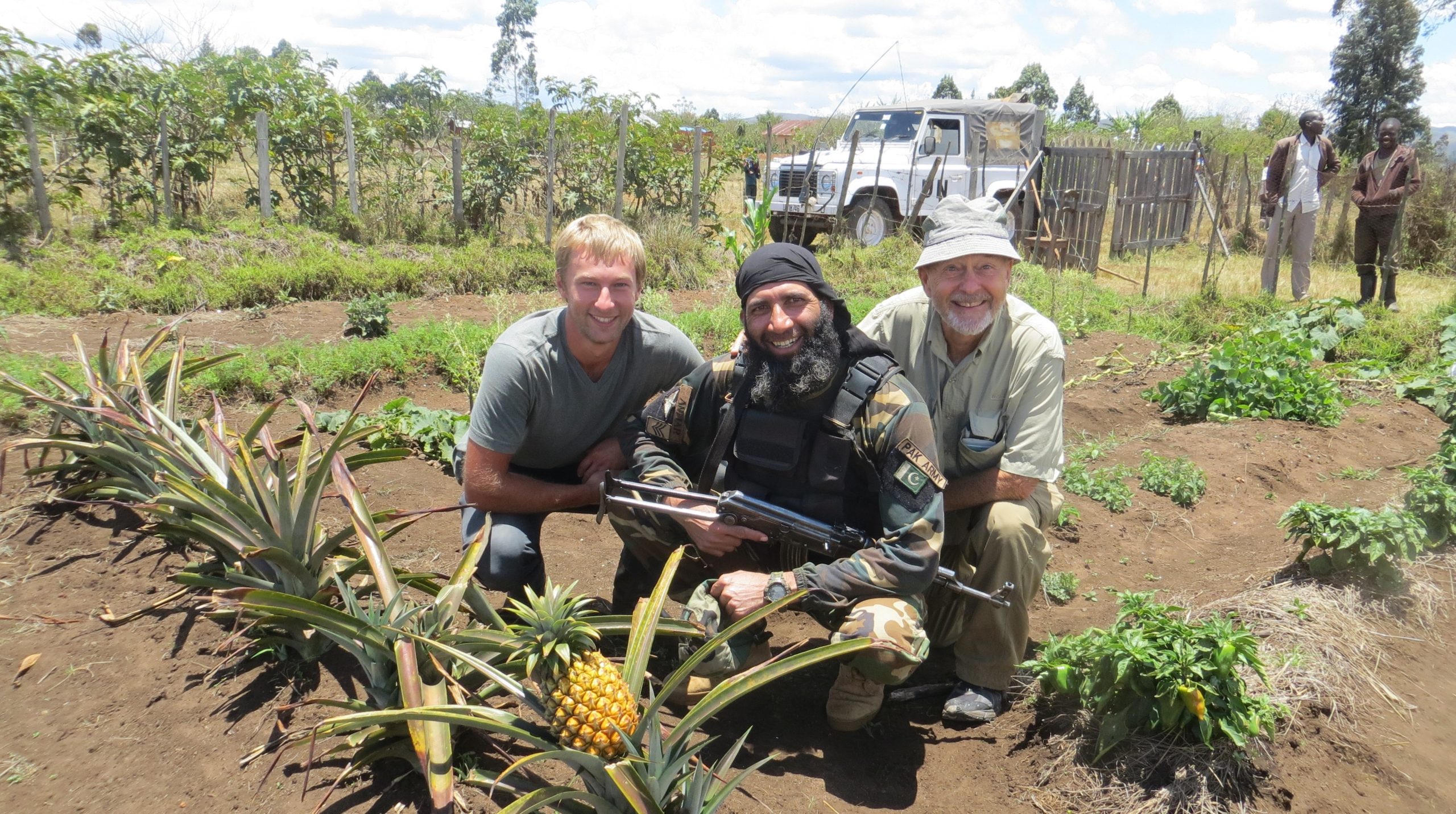
As you can see, the major’s troops had the necessary pineapple protecting firepower…

… and we had the necessary cutlery to consume it.
 The threat of a Mai Mai attack was quite high for a month, so during that time, every evening before I would crawl into bed, I packed these two backpacks so I could quickly run away during an attack.
The threat of a Mai Mai attack was quite high for a month, so during that time, every evening before I would crawl into bed, I packed these two backpacks so I could quickly run away during an attack.
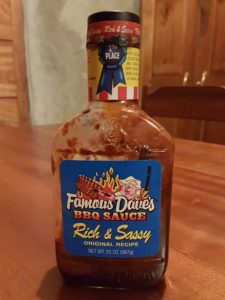 While exiled in Bujumbura, Emilee got her hands on some food that was in an expat giveaway pile. Emilee sent me back up to Minembwe with this bottle of Famous Dave’s BBQ Sauce. We tend to ignore the “refrigerate after opening” warnings posted on some labels as we have no refrigeration, but…
While exiled in Bujumbura, Emilee got her hands on some food that was in an expat giveaway pile. Emilee sent me back up to Minembwe with this bottle of Famous Dave’s BBQ Sauce. We tend to ignore the “refrigerate after opening” warnings posted on some labels as we have no refrigeration, but…


... after a few days of consuming this delicacy, we (Michael, Miles, & Patrick) noticed that the “best used by” date was 1222.16. As none of us had at that point experienced any ill effects, we continued to use every trick in the book to extract and consume every drop of this rich and sassy sauce.
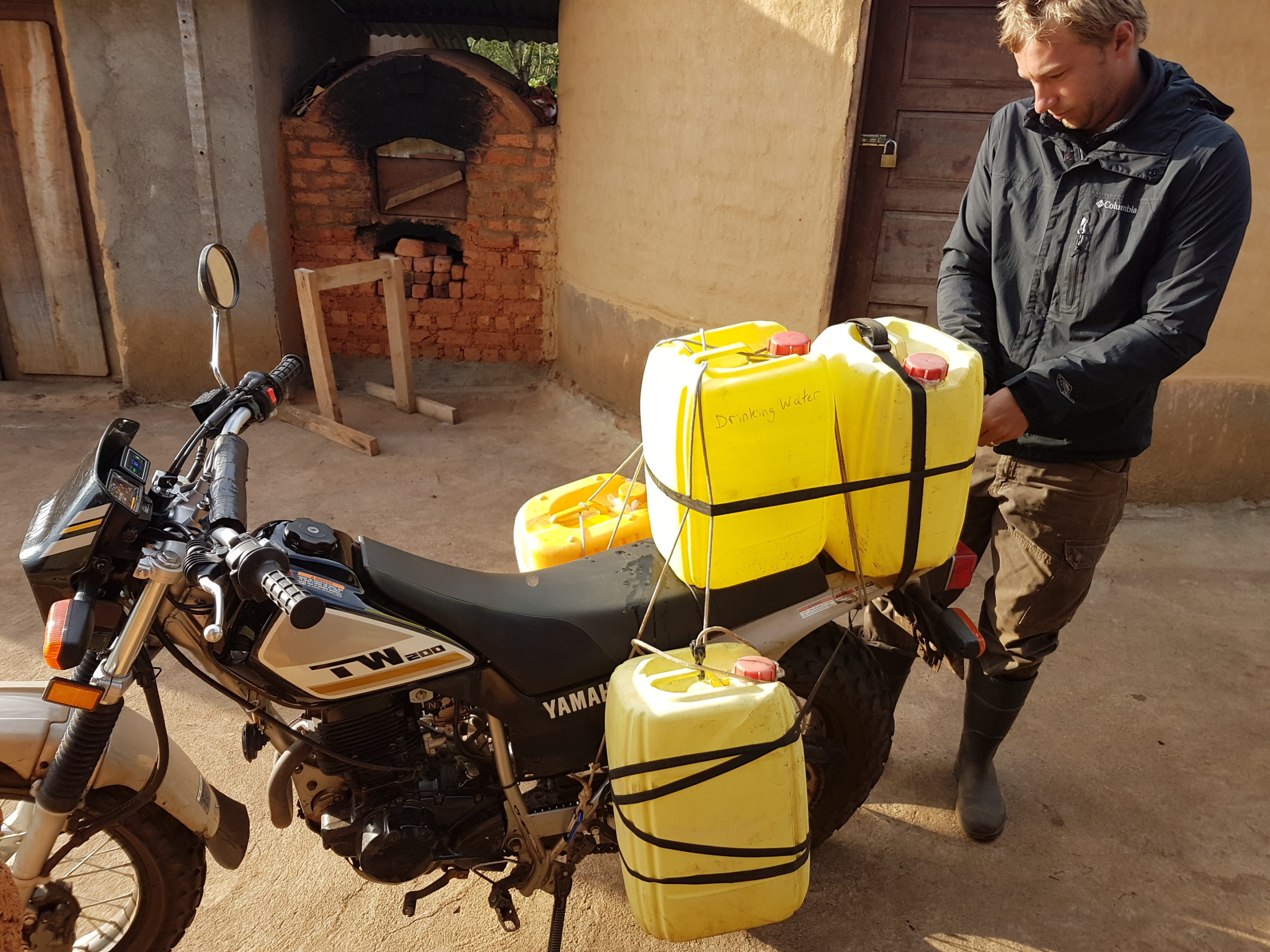 The spring near our house ran dry back in September, so for water we load up the motorcycle and drive to a spring that’s a little more than a mile away.
The spring near our house ran dry back in September, so for water we load up the motorcycle and drive to a spring that’s a little more than a mile away.

The water coming out of the pipe is clean spring water, but we still filter all of the water we use for drinking and cooking.

In the absence of Lisa and Emilee, Namajana has become an expert tortilla maker.
 Since the beginning of the conflict back in March, we’ve been blessed with a string of really great commanders at the local UN peacekeeper base. Each time a new commander comes, the previous commander brings them by our place to see the gardens. In the photo above many of these commanders had flown into Minembwe to strategize with regard to the ongoing conflict, but before they left, they brought a couple of Pakistani UN helicopter pilots to see the gardens.
Since the beginning of the conflict back in March, we’ve been blessed with a string of really great commanders at the local UN peacekeeper base. Each time a new commander comes, the previous commander brings them by our place to see the gardens. In the photo above many of these commanders had flown into Minembwe to strategize with regard to the ongoing conflict, but before they left, they brought a couple of Pakistani UN helicopter pilots to see the gardens.

Here's a small section of what these guys came to see. Look at the background… it is crazy beautiful here.

An expat who was leaving Burundi gave Miles a really nice mountain bike, so we brought it to Minembwe. It wasn’t too long before the orphans started helping one another learn to ride.
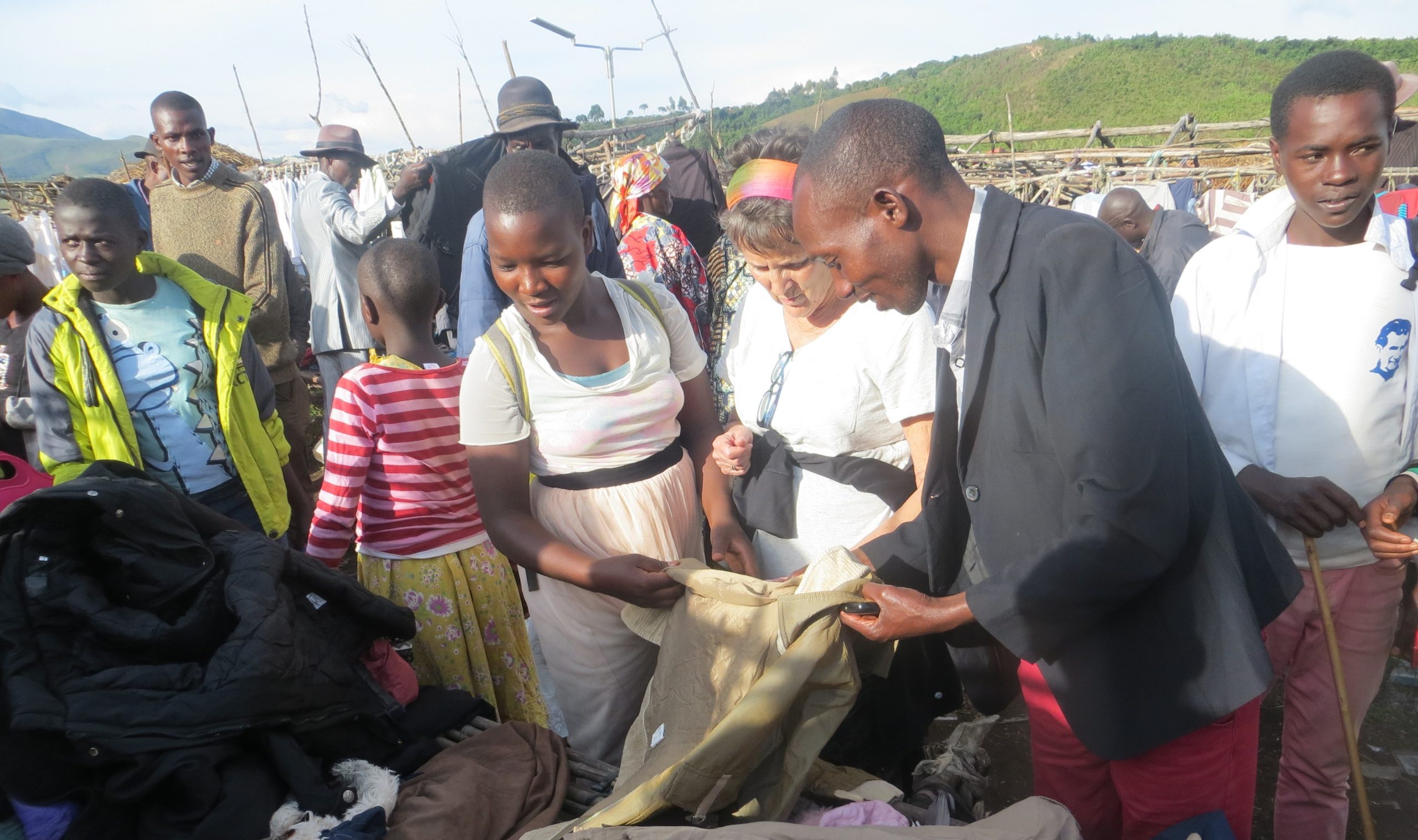 Someone donated some money to buy the orphans some jackets (which cost about five dollars each).
Someone donated some money to buy the orphans some jackets (which cost about five dollars each).
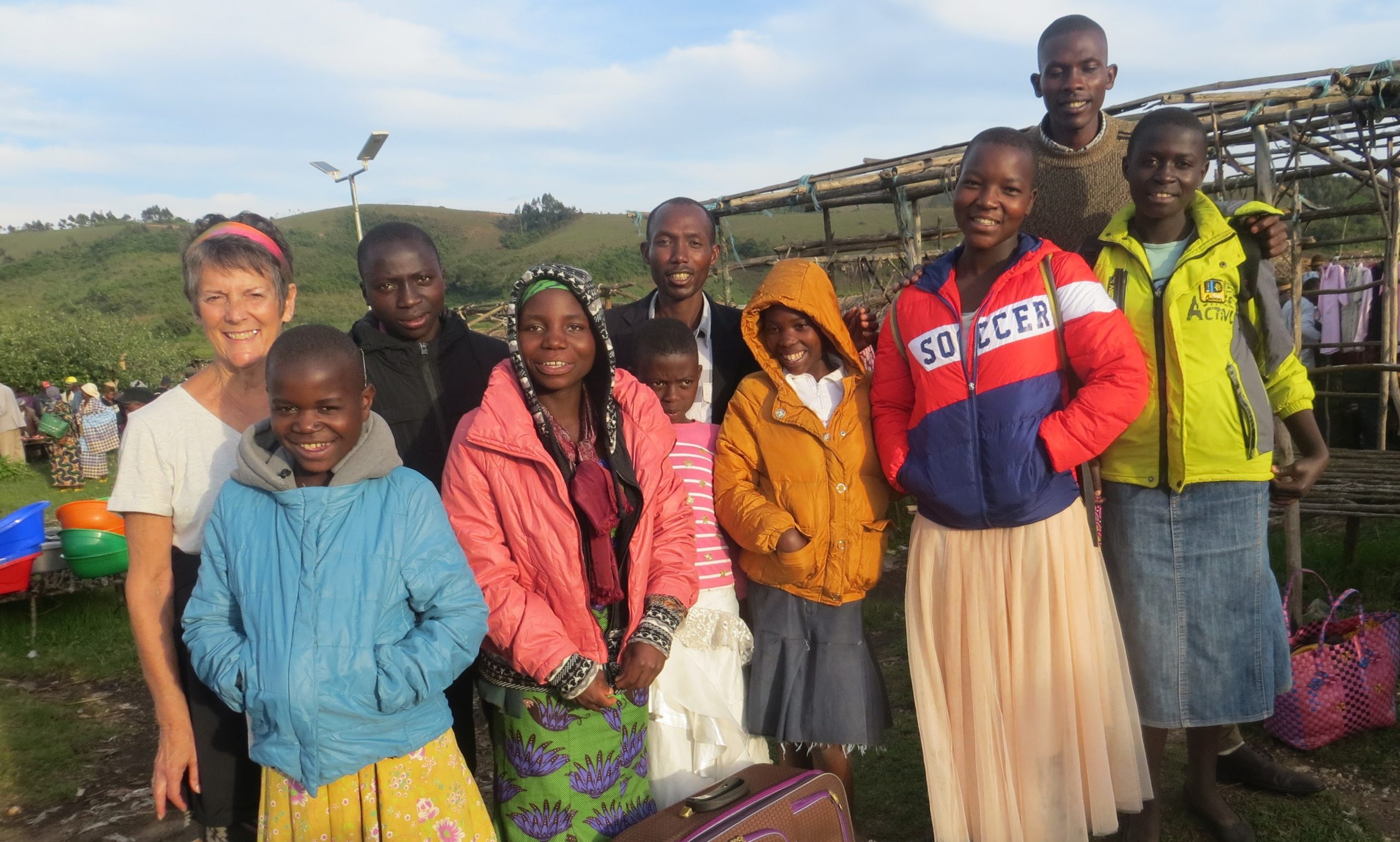 Can you say “Happy?”
Can you say “Happy?”
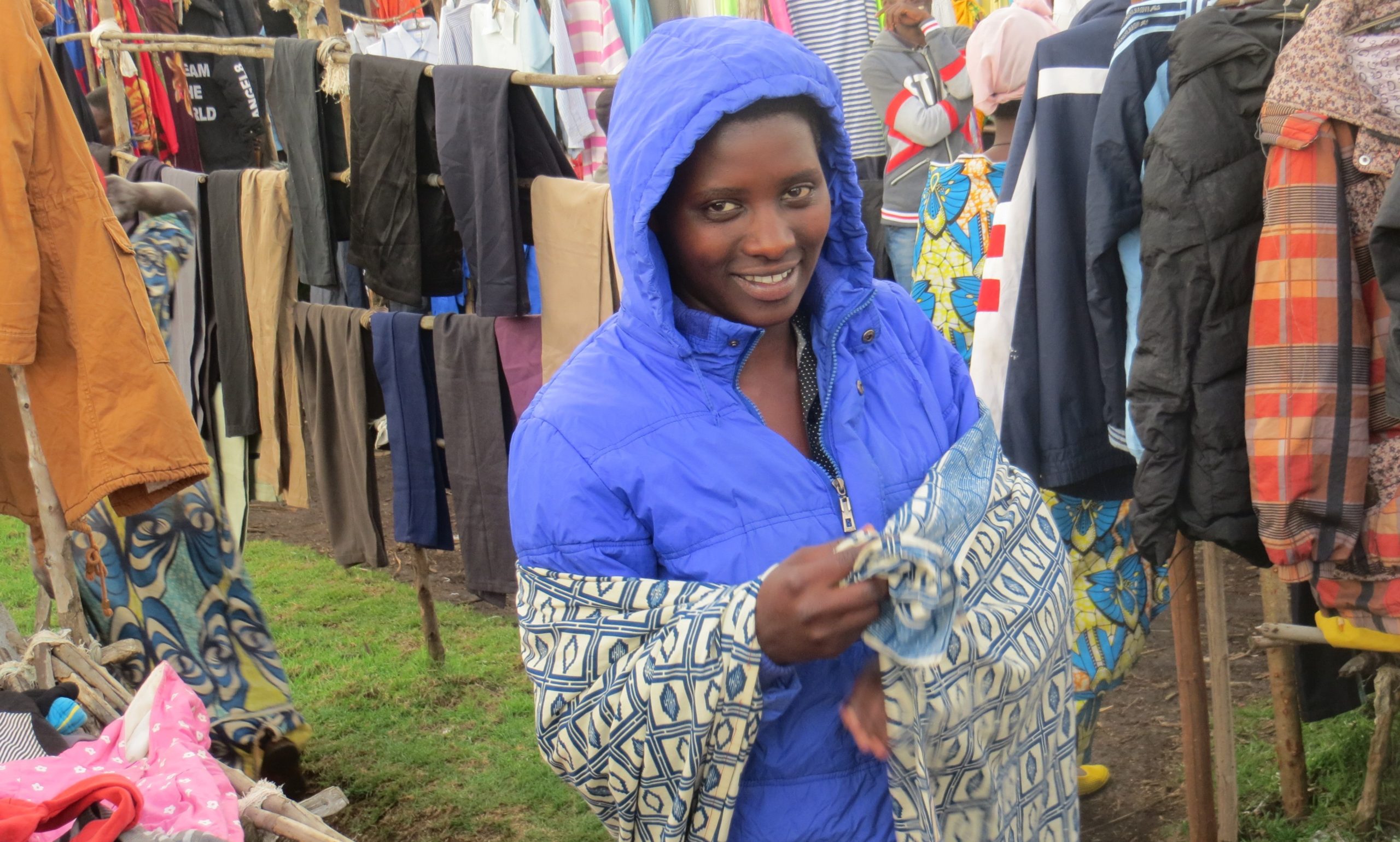 And a coat for Joyeuse, the eldest, who this year began her second year at the university.
And a coat for Joyeuse, the eldest, who this year began her second year at the university.

Patrick and Thelma brought 75 Sawyer water filter systems to Minembwe, but sadly, due to the war and other circumstances, they were not able to distribute the filters and buckets. It was possible for Patrick to set up a system at the orphanage though. Normally locals would stack this system on bricks, but Patrick built this wooden stand.

Patrick instructing Ntebutsi, the orphanage manager, how the Sawyer water filter system works, and Ntebutsi then instructed the kids how to use the system.
 Clean water is something to smile about in Minembwe.
Clean water is something to smile about in Minembwe.

One thing Thelma did get to distribute was love. The recipient this time was one of the twins that the orphanage took in last July. Thank you to those who are paying for their formula!
Somehow,
Michael
The Garden of Peace
Being in our area of Minembwe is a bit surreal. Every day, or at least every other day, you hear of skirmishes or full-out battles happening in the outlying areas. There is a path which runs next to our dwelling that has a high volume of foot traffic; daily we see both students of all ages and soldiers coming and going, and many refugees coming. Yet, if you look out across the valley, things seem so peaceful. But, if you visit the nearby hospital, you are quickly dragged back into reality. We are at the local hospital nearly every day. Miles spends a lot of time there repairing or “innovating” things, and we are constantly encouraging people to go to the hospital. We often ask the locals, “That’s a really bad cough/sore/wound. Have you taken him to the hospital yet?” Their response typically is “No” or “We took him to the clinic or to the traditional doctor (in essence and for lack of a better title, a “witch doctor”).”
At the hospital, especially now with so many refugees, you’ll find sickness (dysentery, malnutrition, bacterial/viral chest infections, typhoid, malaria) and the many wounded combatants and civilians. My previous viewings of bullet wounds has been limited to movies and television, but in Minembwe I can reach out and touch victims. I could show you some gruesome photos of bullet entry and exit wounds in children, but I won’t. Now that so many people have fled as refugees, sadly the majority of more recent civilian injuries are from being confronted by the Congolese soldiers.
Another casualty of war is education. The local schools are flooded with refugees, and most teachers are going unpaid (or at least underpaid) because the student’s families, local or refugee, do not have any money to pay the school fees. For the state school, teachers’ salaries are partially paid for by charging tuition, but private schools are 100% funded by tuition and grants/donations. The villagers of Kivumu had to flee, but they have tried to settle their community close together so they could more easily continue to educate their children. Remarkedly, 80% of the students of Kivumu are still meeting for school.
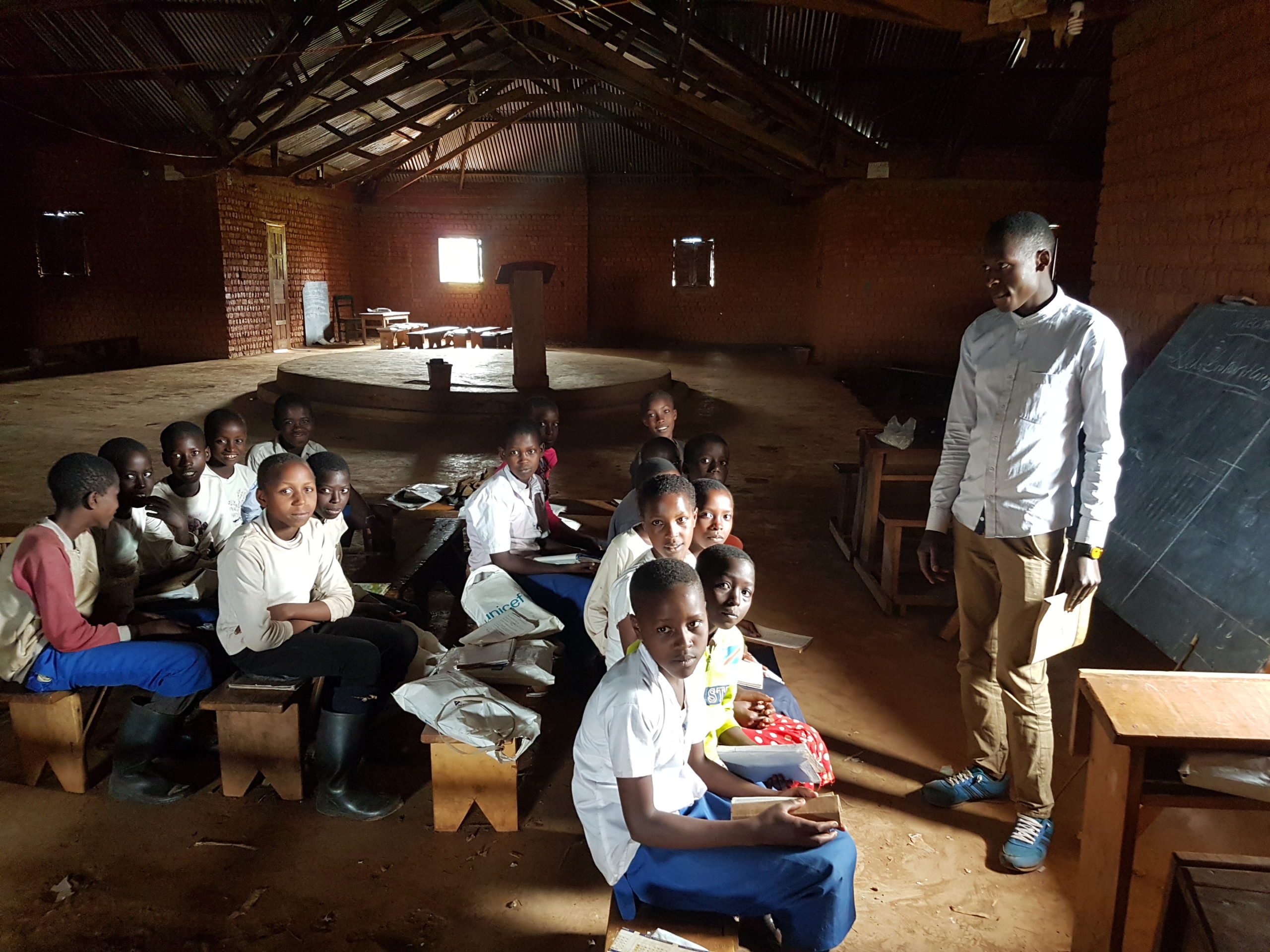 The teachers and kids from Kivumu now meet in a church near us as their village was attacked and destroyed twice. It was strange to visit this school in this church because...
The teachers and kids from Kivumu now meet in a church near us as their village was attacked and destroyed twice. It was strange to visit this school in this church because...
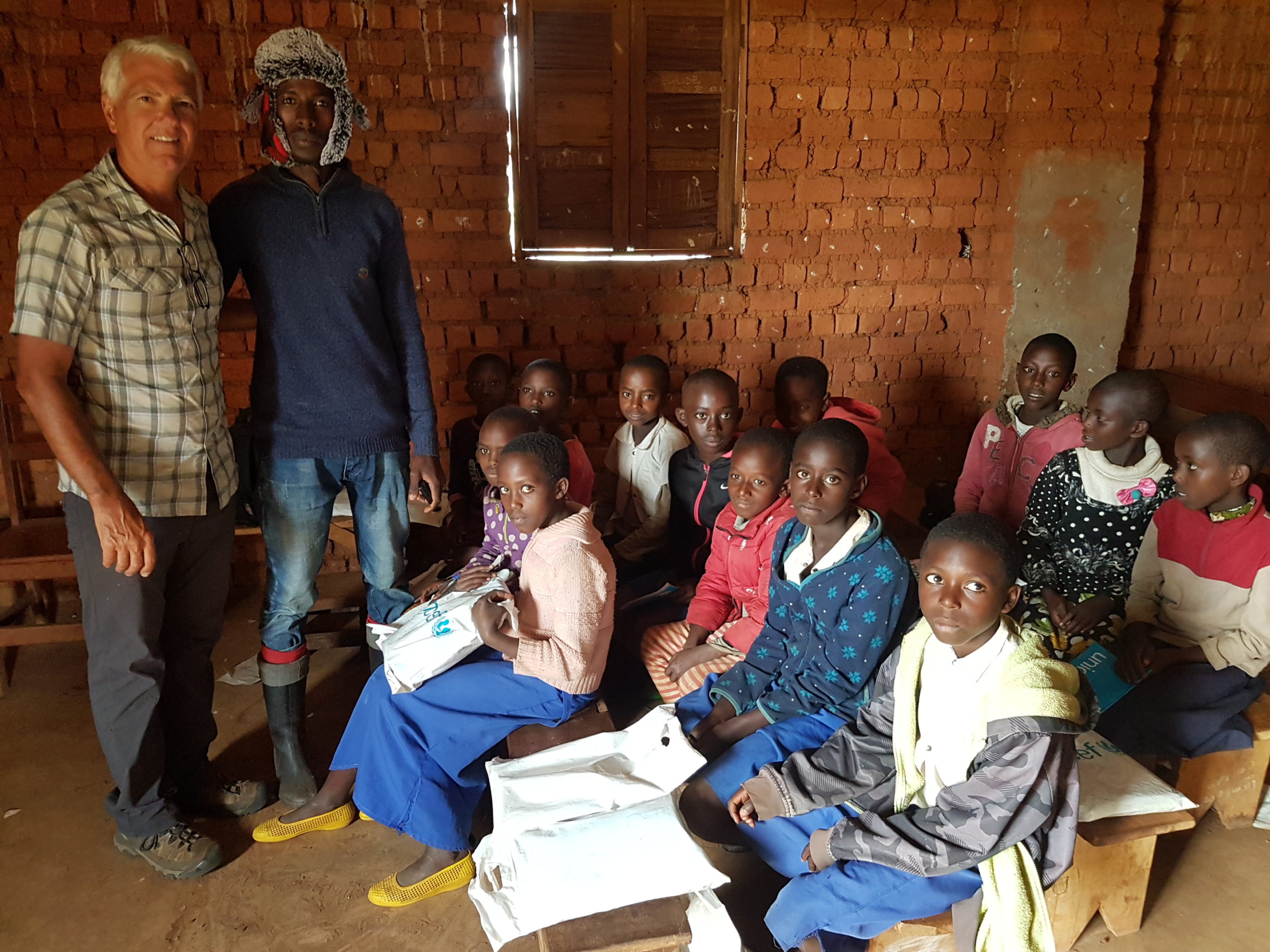
... it wasn't too many months ago that Miles and I visited this school in Kivumu. Last summer, Miles was supposed to teach a course on electricity for interested students.

This might look pretty rough to you, but even this unfinished portion of the church is in better shape than the classrooms they formerly met in back in their village.
Although this is all a new and sad reality for me, this is business as usual in Minembwe. So, we just keep moving along with everyone else. Shortly after Patrick and I arrived, Patrick started dispensing the 100 pairs of eyeglasses (readers) that he and Thelma brought. On day one, from our front porch, Patrick passed out four pairs of glasses. Word of the glasses spread quickly, and on day two Patrick passed out another 50 pairs of glasses. On day three, the rest of the glasses found owners; since then we daily have to tell people that our supply of glasses has been exhausted.
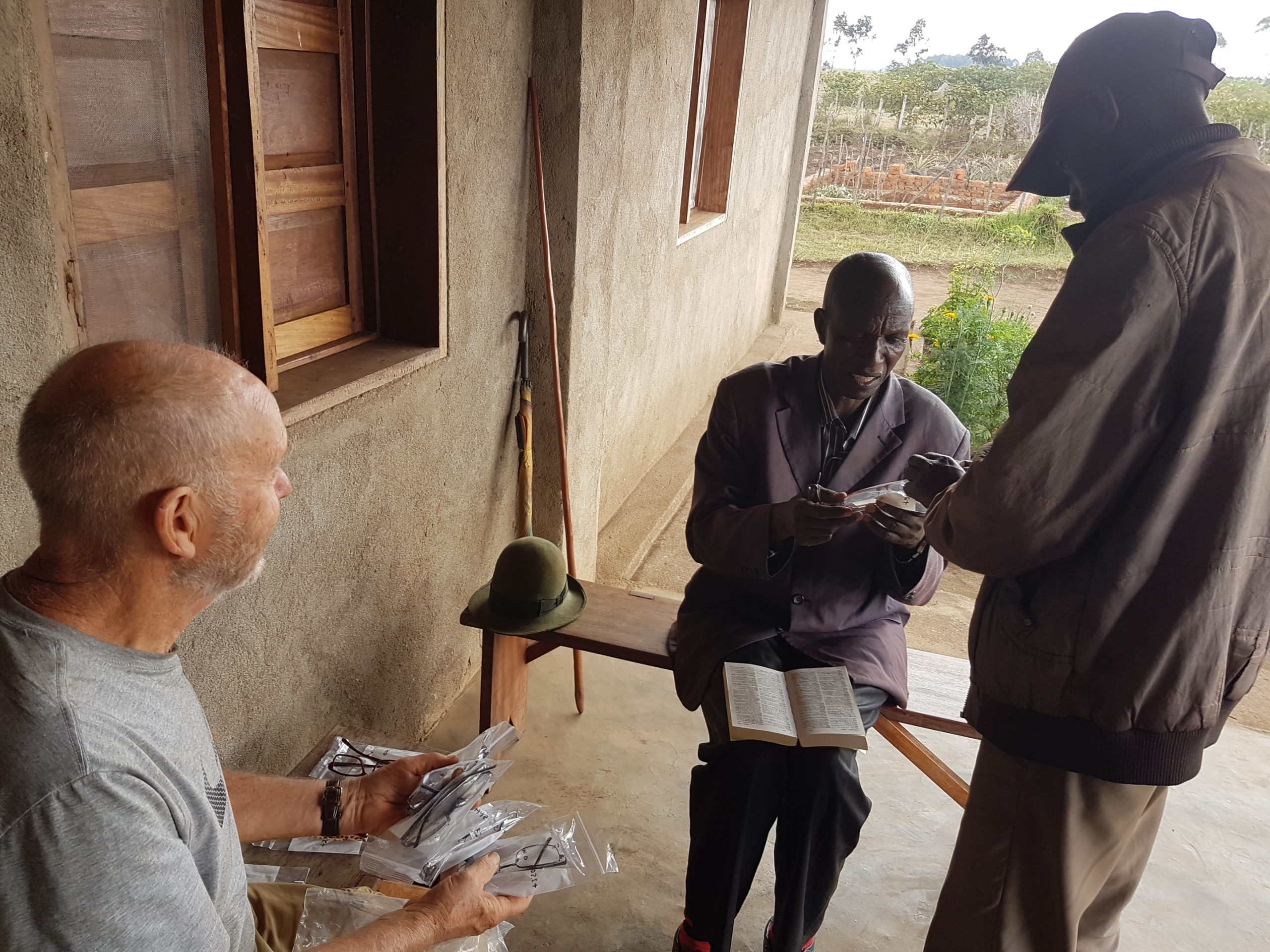 It's a joy to help people see well enough to read.
It's a joy to help people see well enough to read.
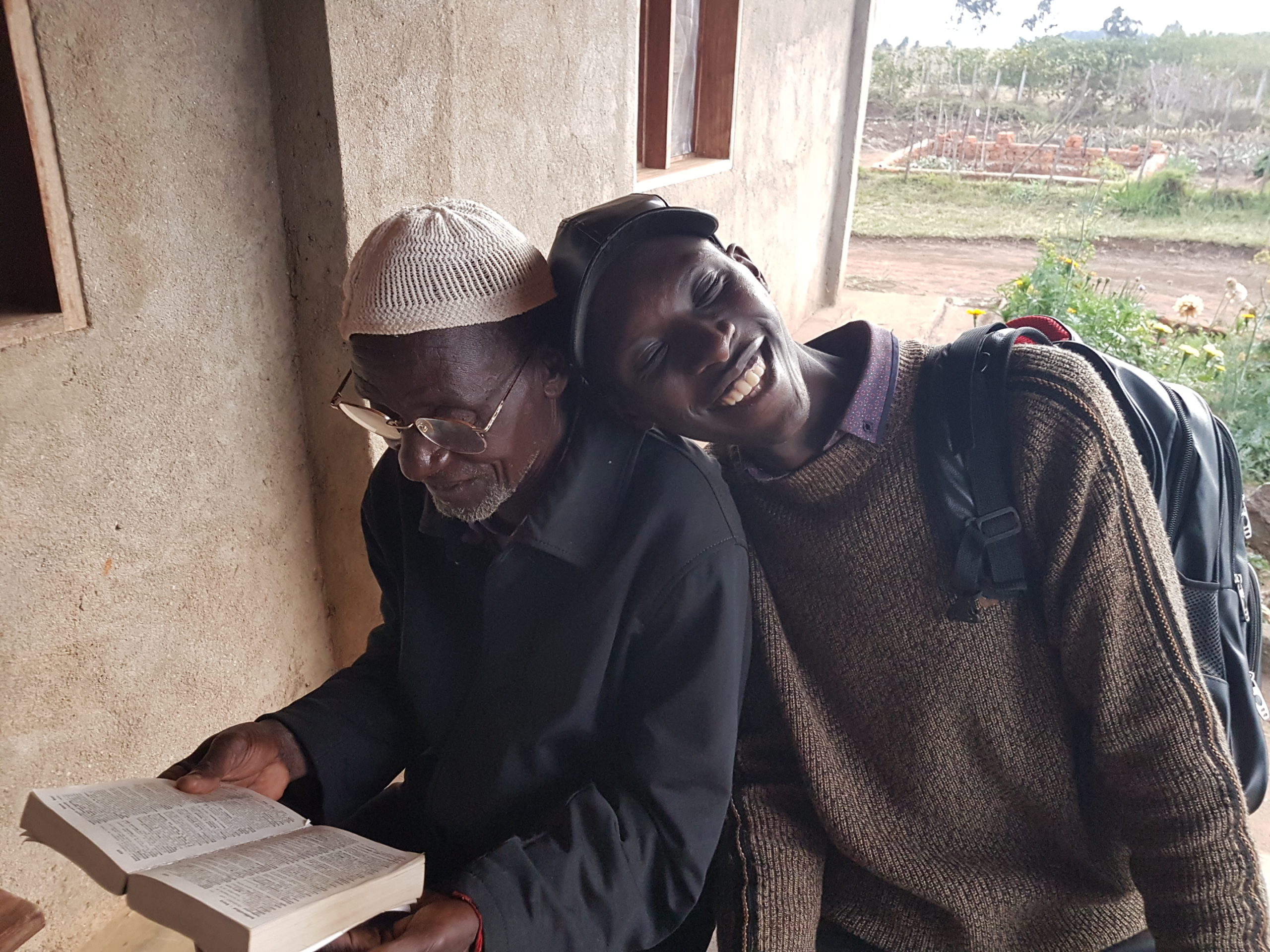 Our friend Bonnke joking around with his neighbor, our area's token local Muslim.
Our friend Bonnke joking around with his neighbor, our area's token local Muslim.
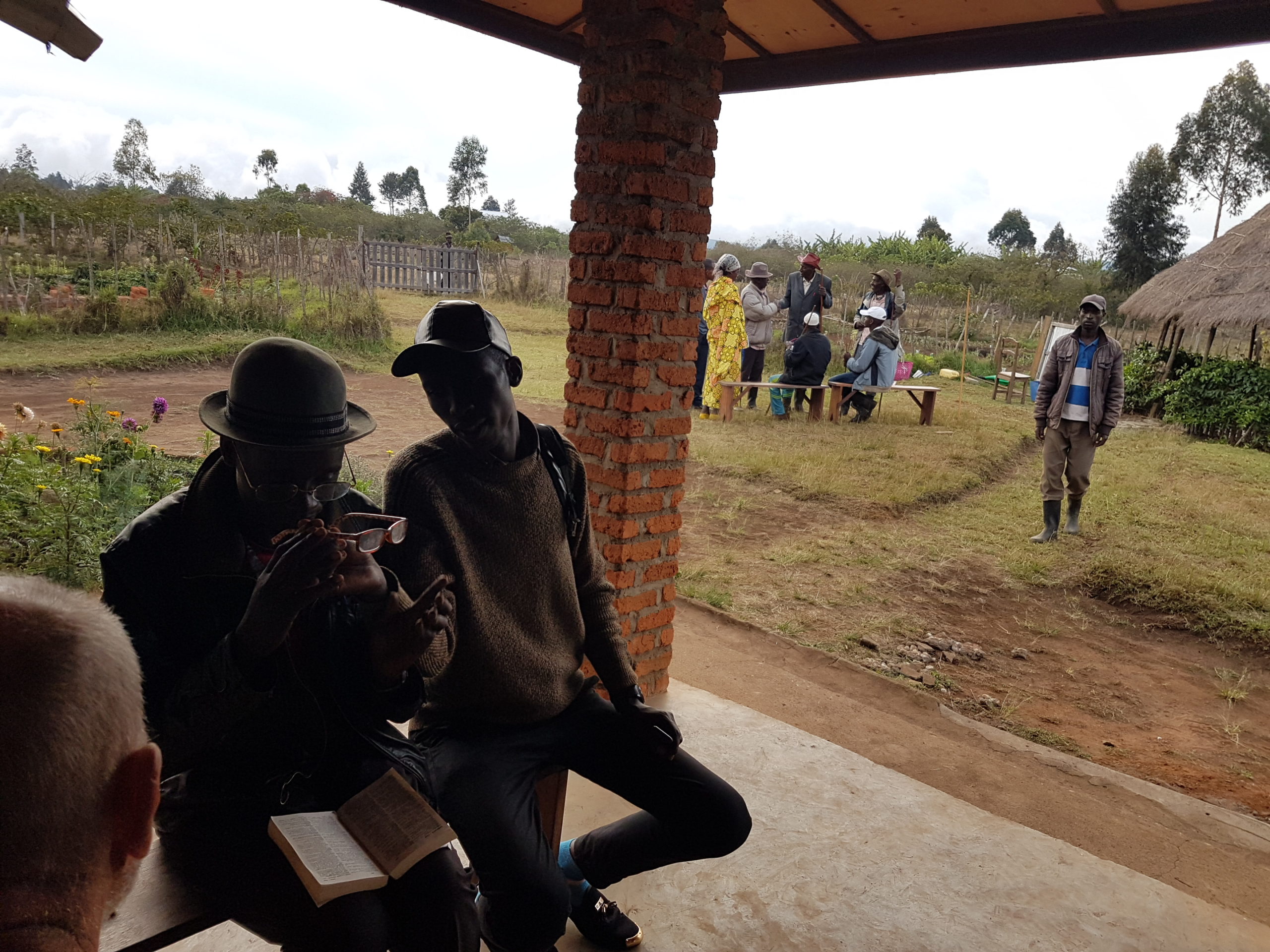
By day two there was a line starting to form.
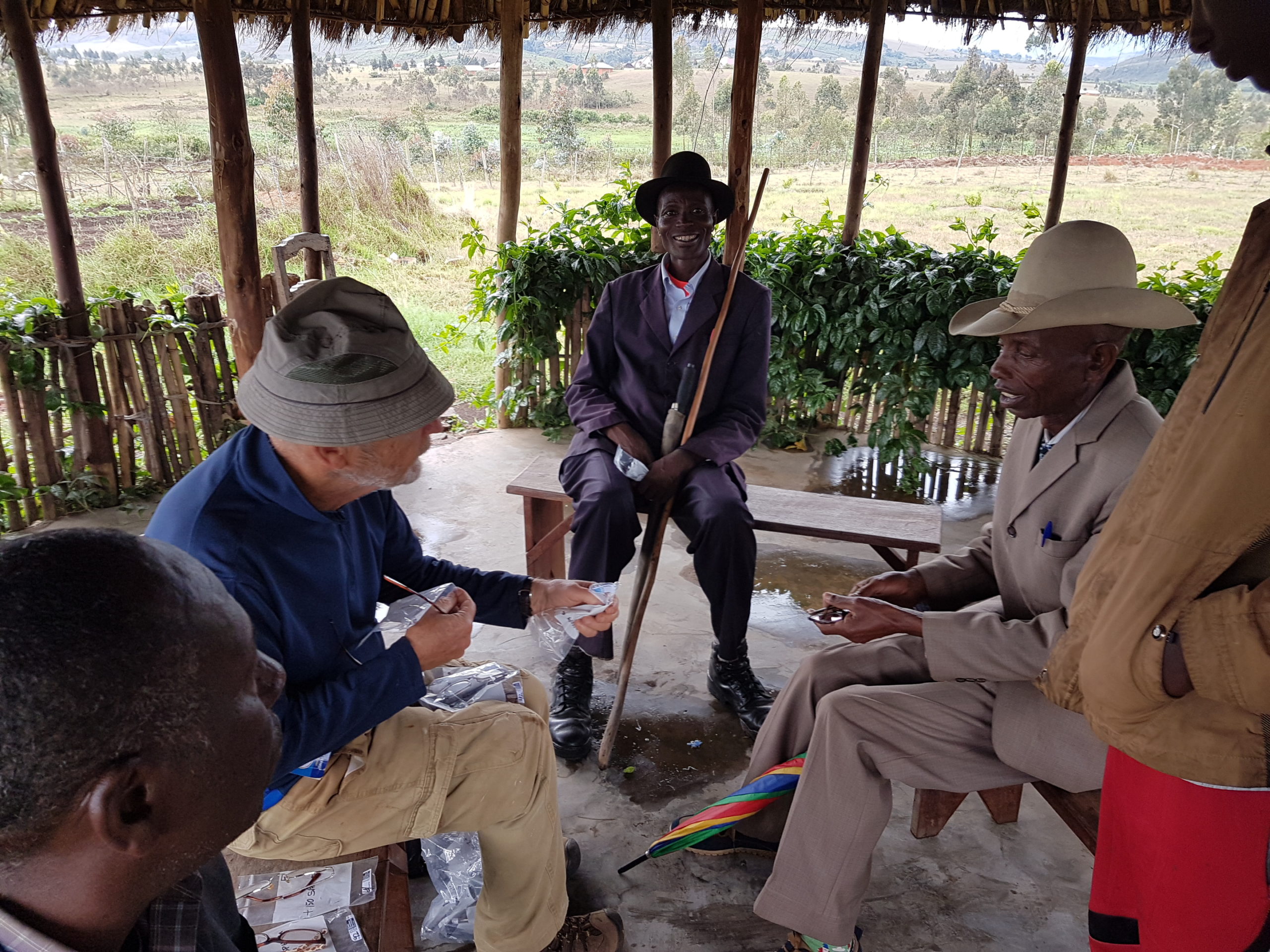
On day three...

...there was a non-stop stream of people...
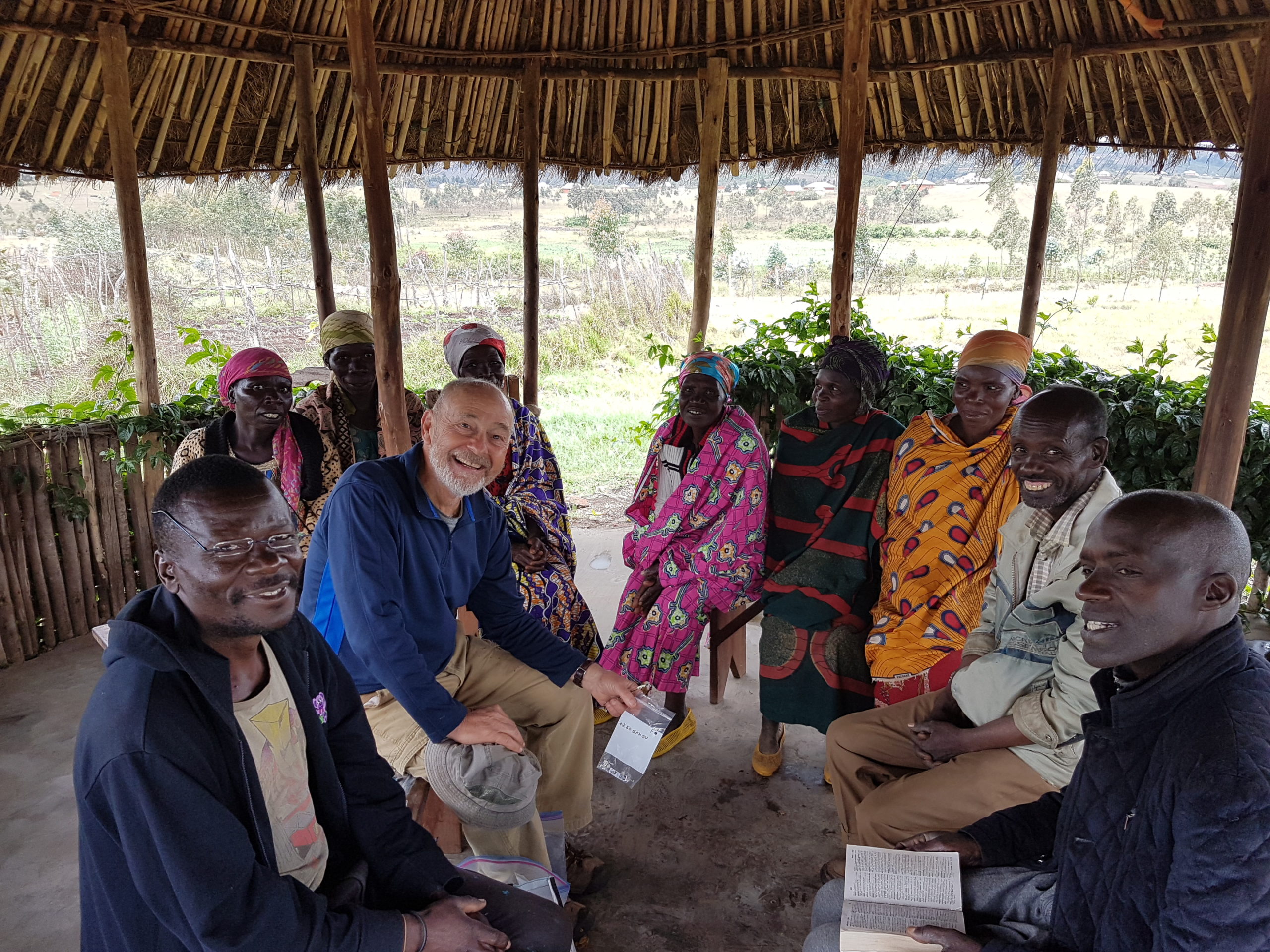
...coming to see Patrick.
Two months ago, we hired a young man named Ntebutsi to manage the orphan home that we work with.What a wonderful difference this has made in the care of the children. Ntebutsi is 28 years old, married, and the father of a little boy he named Miles . Ntebutsi has worked alongside us for five years now, and a good portion of that time was spent helping the orphans develop their gardens. Ntebutsi is loved and respected by all of the kids; he has been and will continue to be a great role model and mentor. Ntebutsi comes from an amazing and hard-working family whom we adore, one and all.
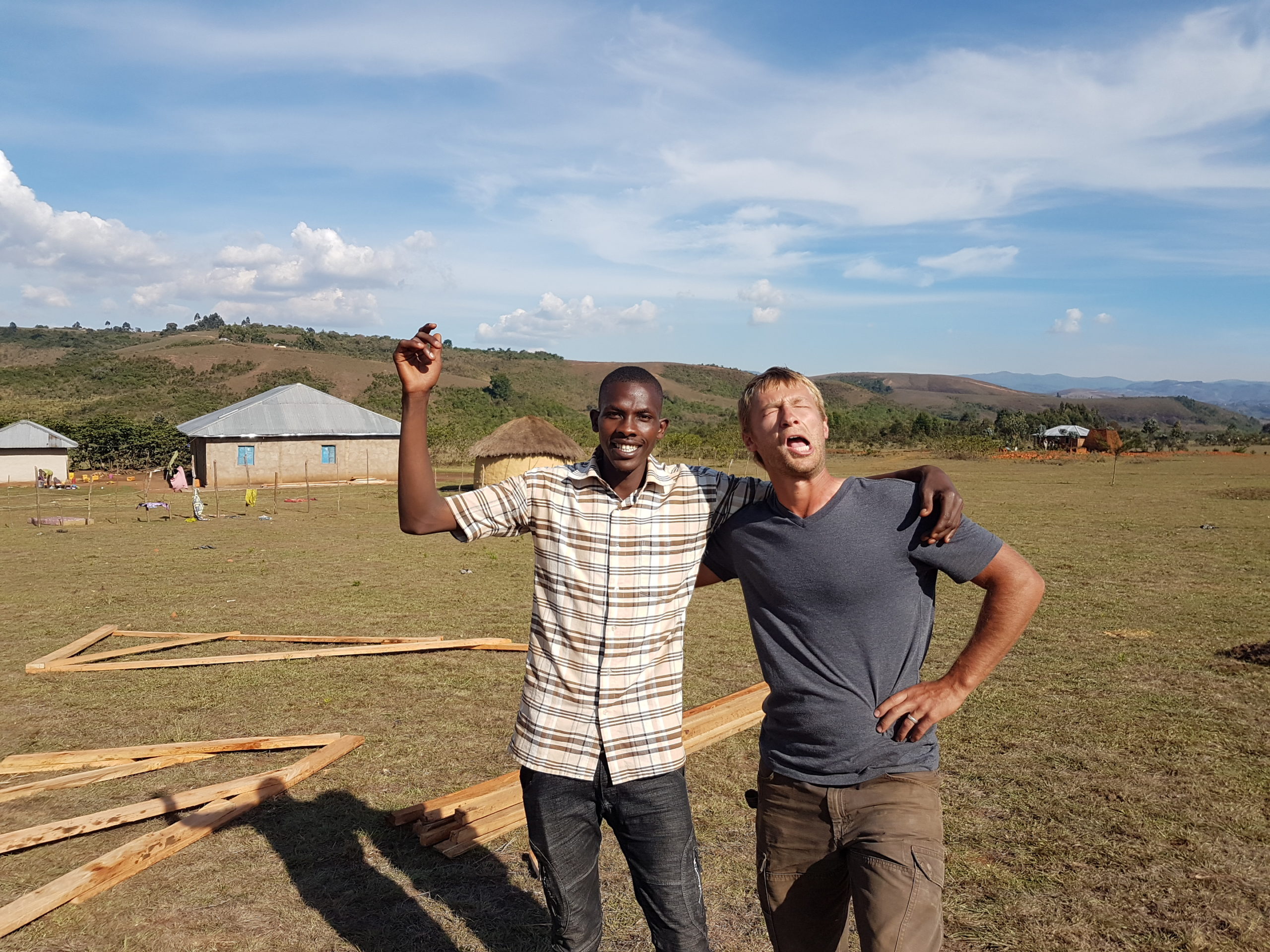
Ntebutsi refers to our Miles as his "twin."

The "twins" working on the home for the manager.

Where the home sits in relationship to the orphans' home.
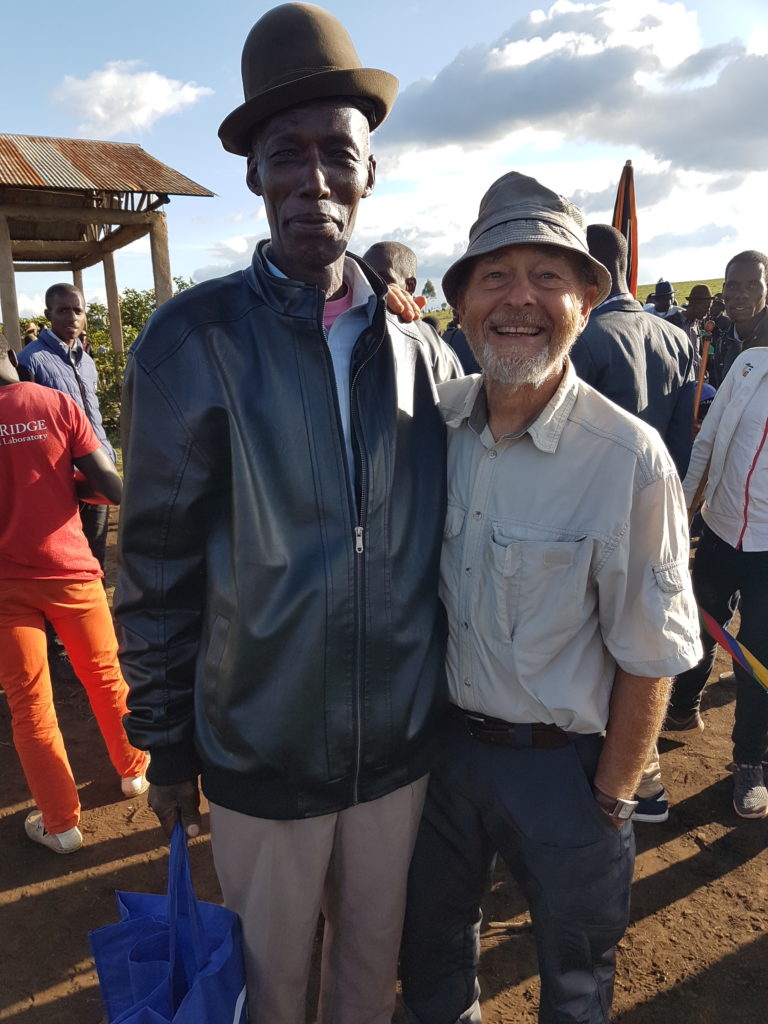
Patrick meeting Ntebutsi and Boonke's grandfather at the soko (market).
Back in January, prior to our last three major conflicts, we were looking for a way to sustain the swelling food budget for the 27 orphans and 2 caretakers. Ntebutsi’s younger brother Bonnke came to us with an idea to grow large scale crops, something that, to our knowledge, isn’t done in Minembwe. We funded Bonnke, then watched the conflicts of March, June, and current conflict spiral out of control. We thought the project had failed several times, but Bonnke stuck with the project, planting and then replanting the fields when they were torn up by fleeing people and their wandering sheep and cows.

Visiting the project and taking a photo with all of Bonnke's employees. You can bet that these people are thankful to have a paying job during the conflicts.

The area of the crops.
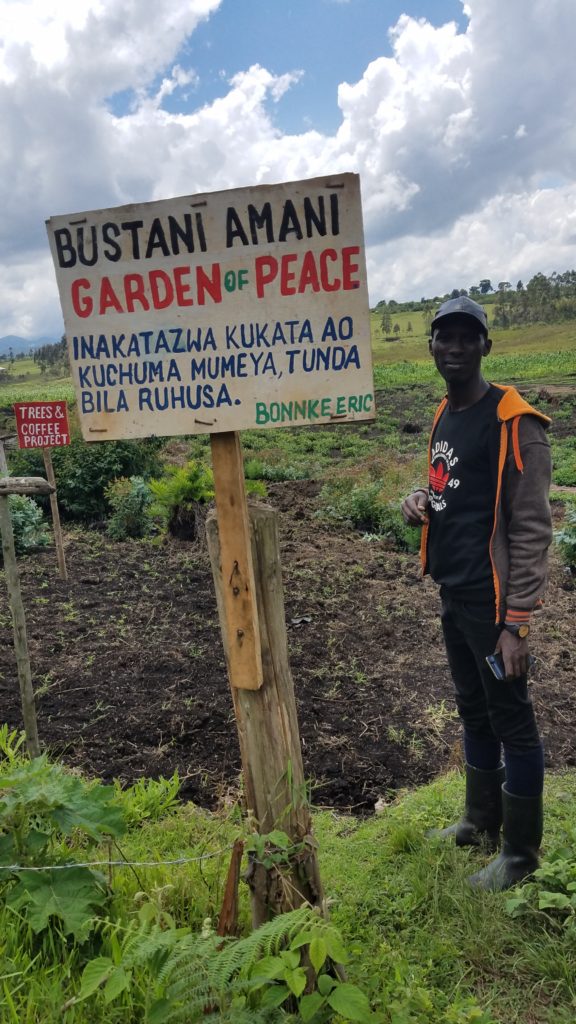
Bustani Amani... Garden of Peace
Last week, Bonnke began to market the African eggplant, the first of the crops to mature; other crops include bell peppers, cabbage, carrots, garlic, and onions. Ironically, Bonnke and Lisa named all of our fields Bustani Amani, or in English, the “Garden of Peace.”
Somehow,
Michael
